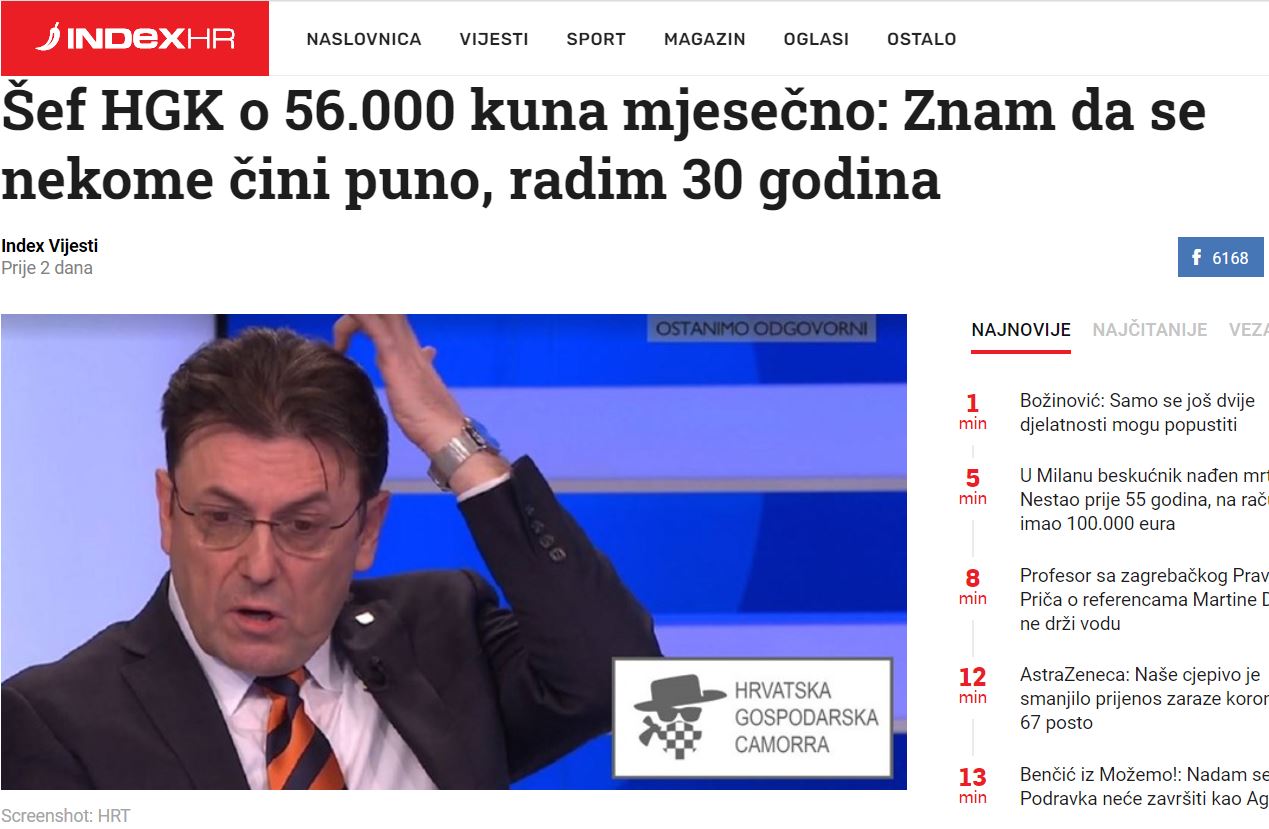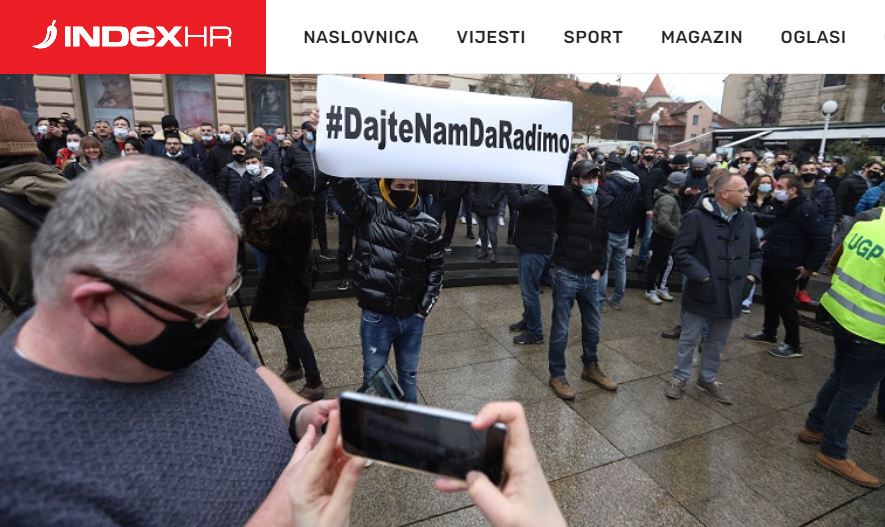HNL Round 19 Recap: Hajduk Tops Istra, Osijek Wins 3:0
February 4, 2021 - The 19th round of the Croatian First League was held mid-week, on February 2 and 3, 2021. In this round, Hajduk tops Istra, and Osijek records a 3:0 win against Slaven Belupo.
Osijek v. Slaven Belupo (3:0)
Osijek and Belupo opened the 19th round at City Garden Stadium on Tuesday, February 2, 2021.
Brlek opened the scoring spree for Osijek with a goal just before the whistle blew for halftime (45+3'). A quick goal to start the second half by Zaper made it 2:0 in the 52nd minute, and 3:0 in the 55th minute thanks to Bohar.
Osijek is currently in 2nd place with 42 points, while Belupo is in 6th place with 20.
Dinamo v. Lokomotiva (2:0)
Dinamo and Lokomotiva met for the Zagreb derby on Tuesday, February 2, 2021, at Masksimir Stadium.
Gavranovic scored an early goal for Dinamo in the 9th minute for the 1:0 lead, which was the score at the half. Atiemwen increased Dinamo's lead to 2:0 in the 64th minute, which was the final result.
Dinamo is currently in 1st place with 42 points, while Lokomotiva is in 9th with 15.
Varazdin v. Gorica (2:1)
Varazdin and Gorica met in Varazdin on Wednesday, February 3, 2021.
While Gorica had the lead going into the first half thanks to a goal by Lovric (0:1), Obregon equalized for Varazdin in the 76th minute, and in the 90th minute, Boban gave Varazdin the lead and ultimately the 2:1 win.
Varazdin is currently in 8th place with 18 points, while Gorica is in 3rd with 33.
Rijeka v. Sibenik (2:2)
Rijeka and Sibenik met at Rujevica Stadium on Wednesday, February 3, 2021.
Sibenik shocked Rijeka with two goals in the 27th and 32nd minutes by Sahiti and Juric. Pavicic scored for Rijeka in the 35th to make it 1:2.
It was until the final minutes of the match when VAR ultimately ruled in Rijeka's favor, and after an 11-minute ordeal, Rijeka was awarded a penalty, which Andrijasevic scored for 2:2 (90+10').
Rijeka is currently in 4th place with 27 points, while Sibenik is in 7th with 20.
Hajduk v. Istra 1961 (1:0)
Hajduk and Istra closed out the 19th round at Poljud Stadium on Wednesday, February 3, 2021.
The only goal of the game came in the 16th minute when Nayir scored for Hajduk. The same player, unfortunately, missed a penalty 10 minutes later to increase Hajduk's lead.
Hajduk is currently in 5th place with 23 points, while Istra is in the last place with 13.
You can see the full HNL table HERE.
To read more about sport in Croatia, follow TCN’s dedicated page.
.
PHOTOS: Amazing Zagorje Wooden House, One Family's Low-Energy Dream
February 4, 2021 – With beautiful views and blended into its surrounding natural landscape, the Zagorje wooden house was built with super-strength, seismic-resistant wood. Environmentally friendly and low energy, its ultra-modern interior will leave you gasping.
It doesn't take much to get yourself a wonderful view in Zagorje. The area 'behind the mountain' has a beyond-pretty topography of rolling agricultural fields, wild countryside, gently sloping vineyards and minor inclines that gift this vista to all. And it is upon these minor inclines that many of the people of Zagorje choose to build their houses. They wake in the morning and take in the view from bedroom windows, balconies, or terraces, connected each day to the land that surrounds them, at one with nature.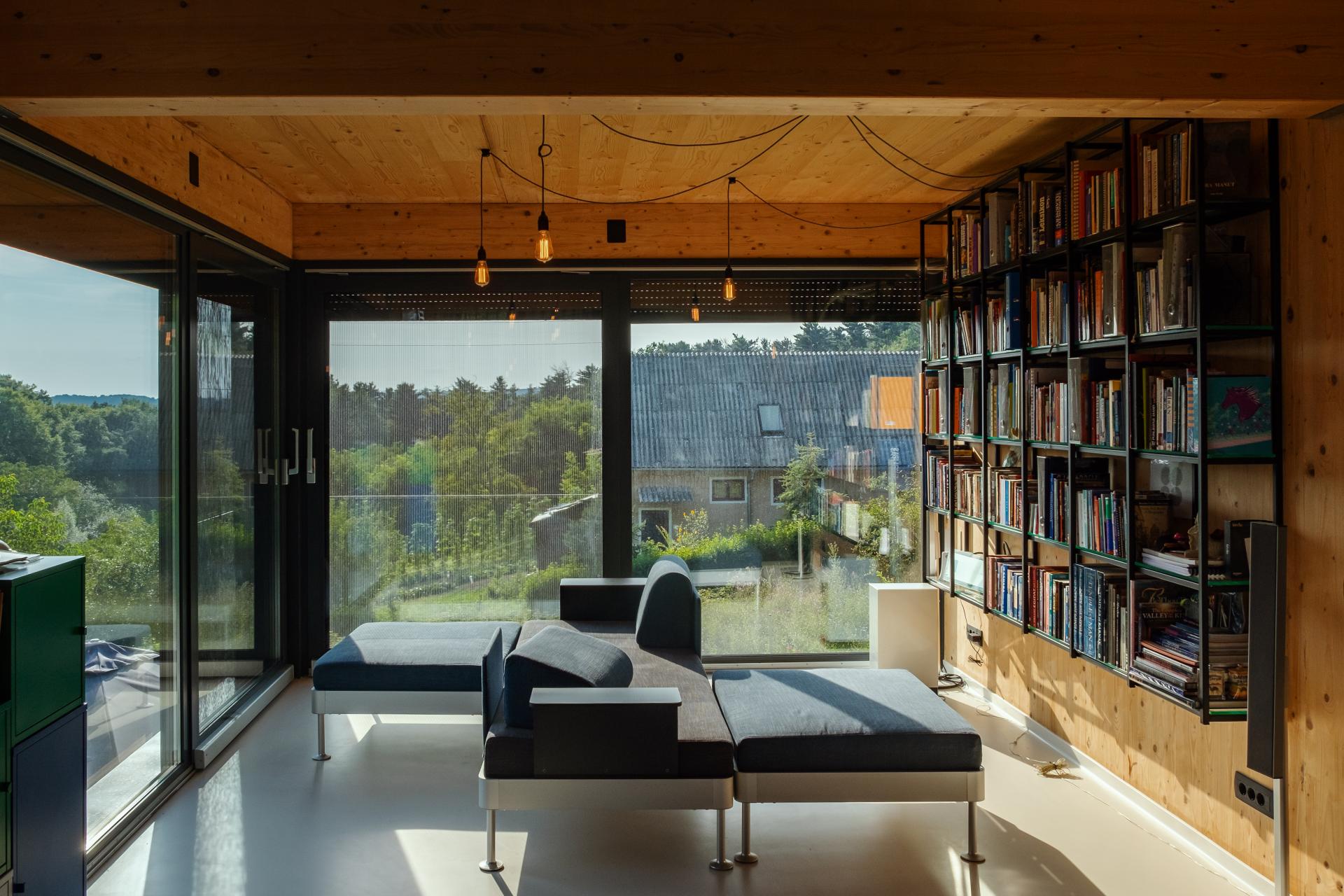
That is exactly the lifestyle one family wanted when they purchased an unfinished building project, sat on the soft slopes of Zagorje. Begun in the 80s, the approved build didn't exactly fit the specifications of their dream. So, they sought a solution from architect Marina Zajec of Arhitektura E.L.I. She kept the volume and ground space from the existing building permit but radically altered the construction materials by using cross-laminated timber (CLT). This beautiful Zagorje Wooden House is the end result.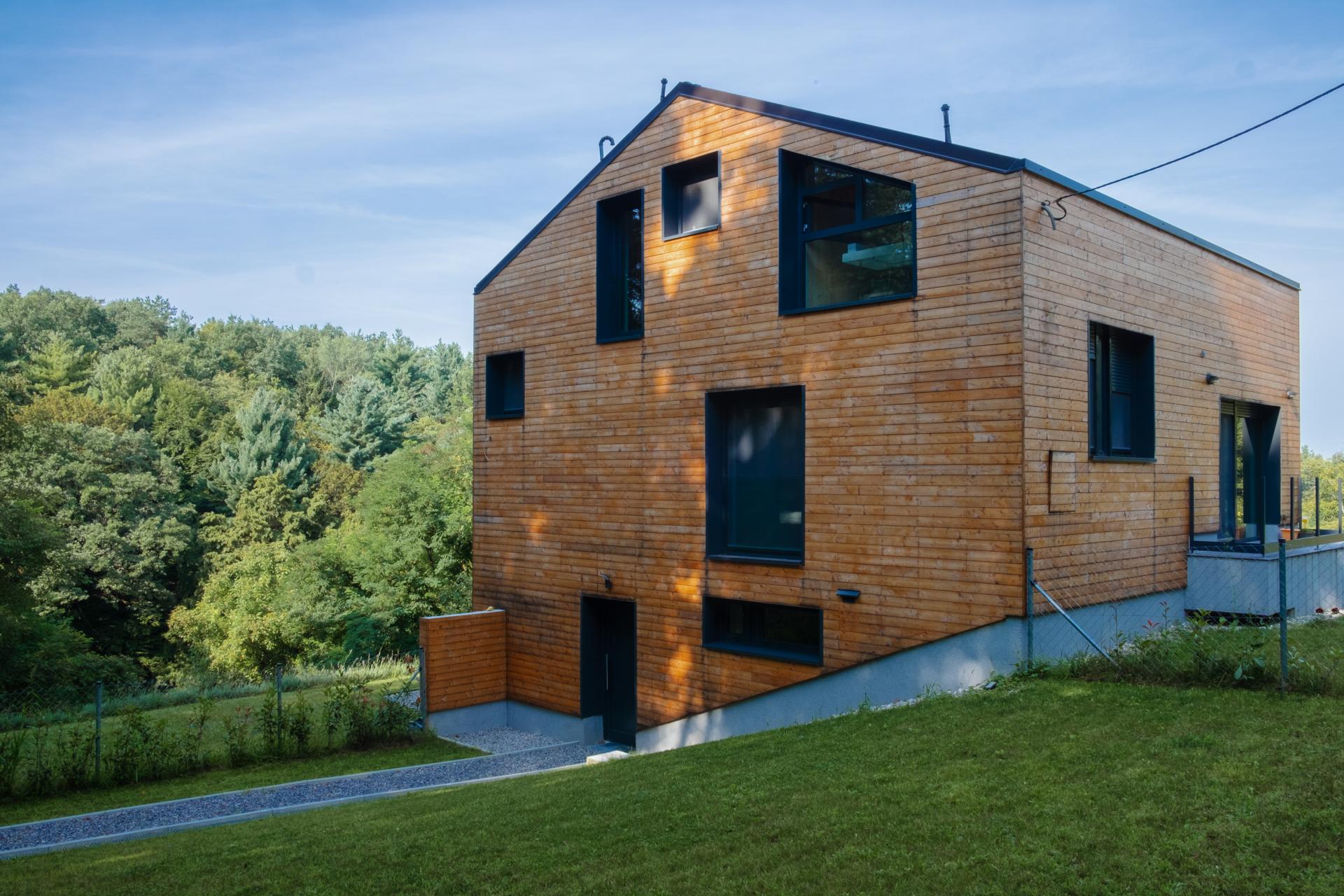
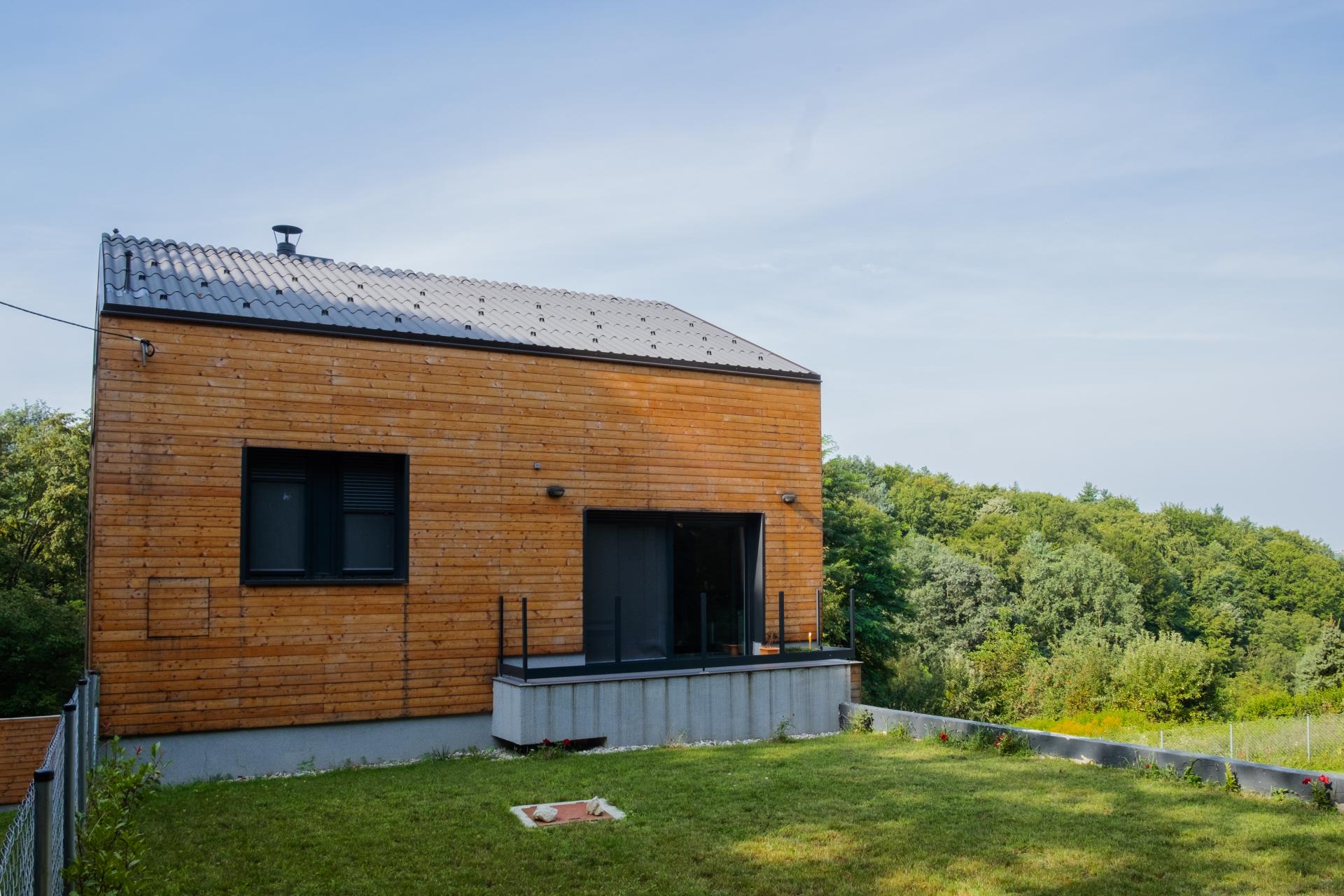
Cross-laminated timber is an engineered by all-natural building material that has the same strength as concrete. It is made by gluing together different layers of single-sawn beams and arranging them so they are perpendicular to adjacent layers. The result is that all the beams face the same way on any visible, outer layer and that the building material is extremely strong. It can easily be used to make load-bearing walls within a classic two-story house, as was done here, and can withstand any seismic activity it might experience in this region.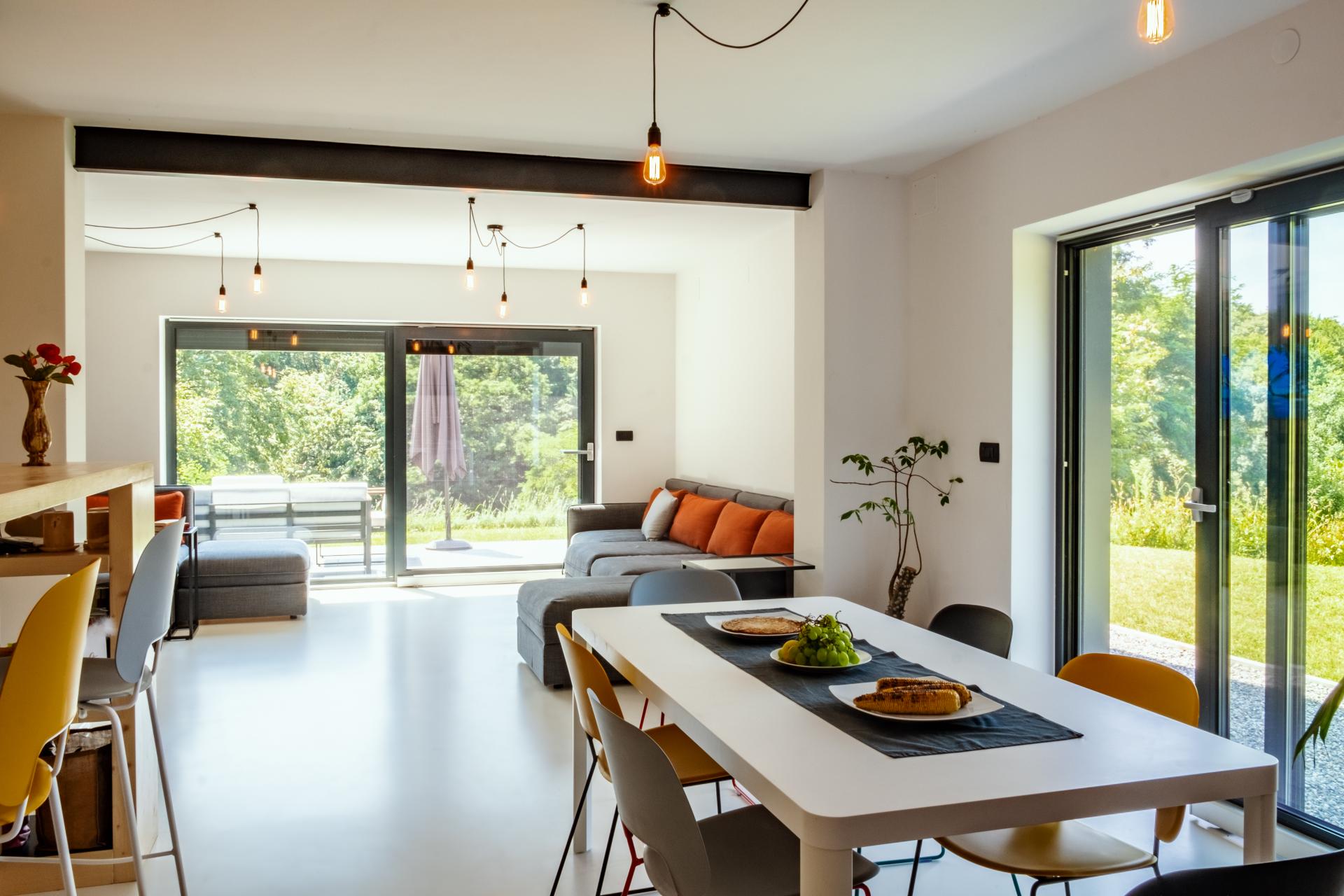
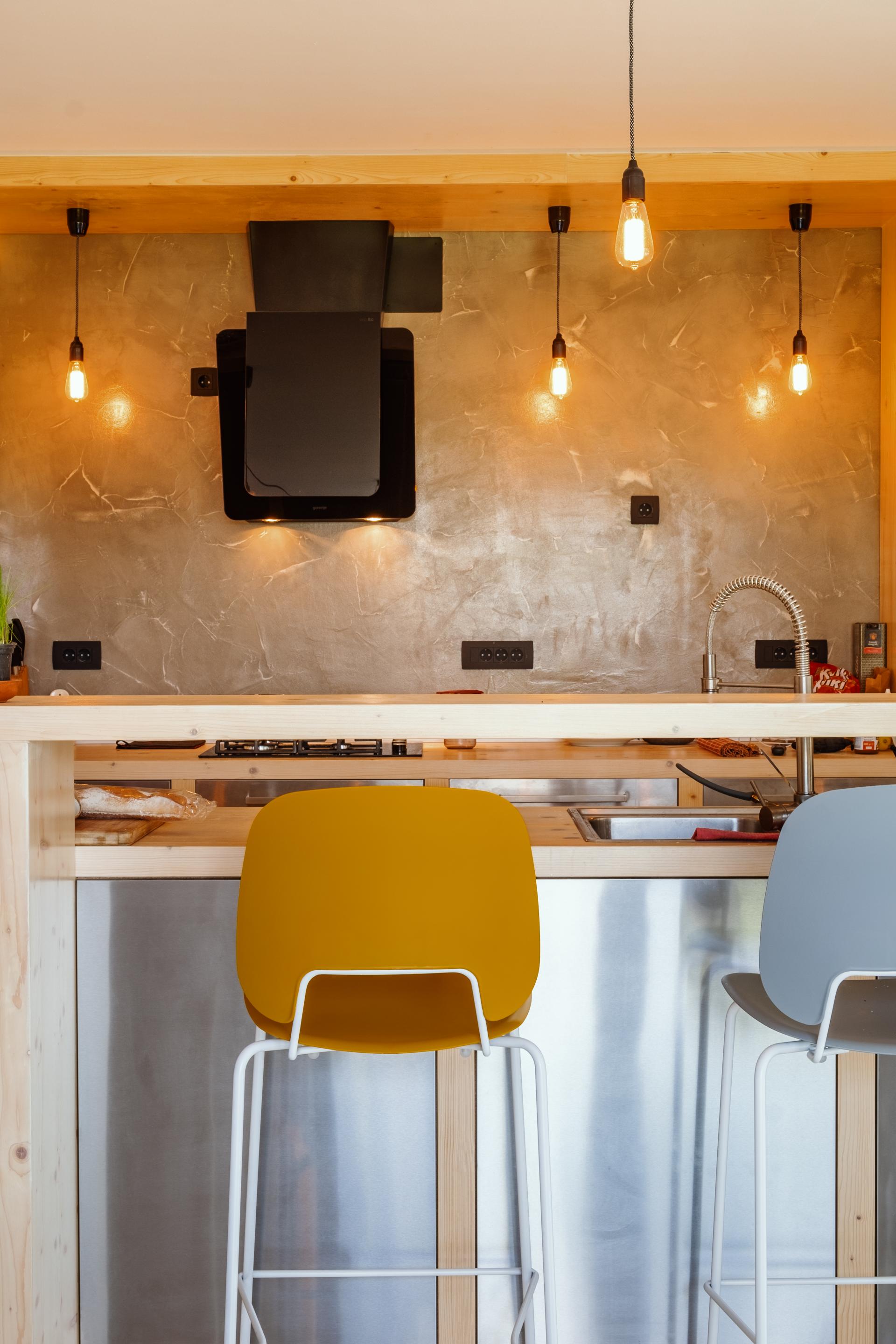
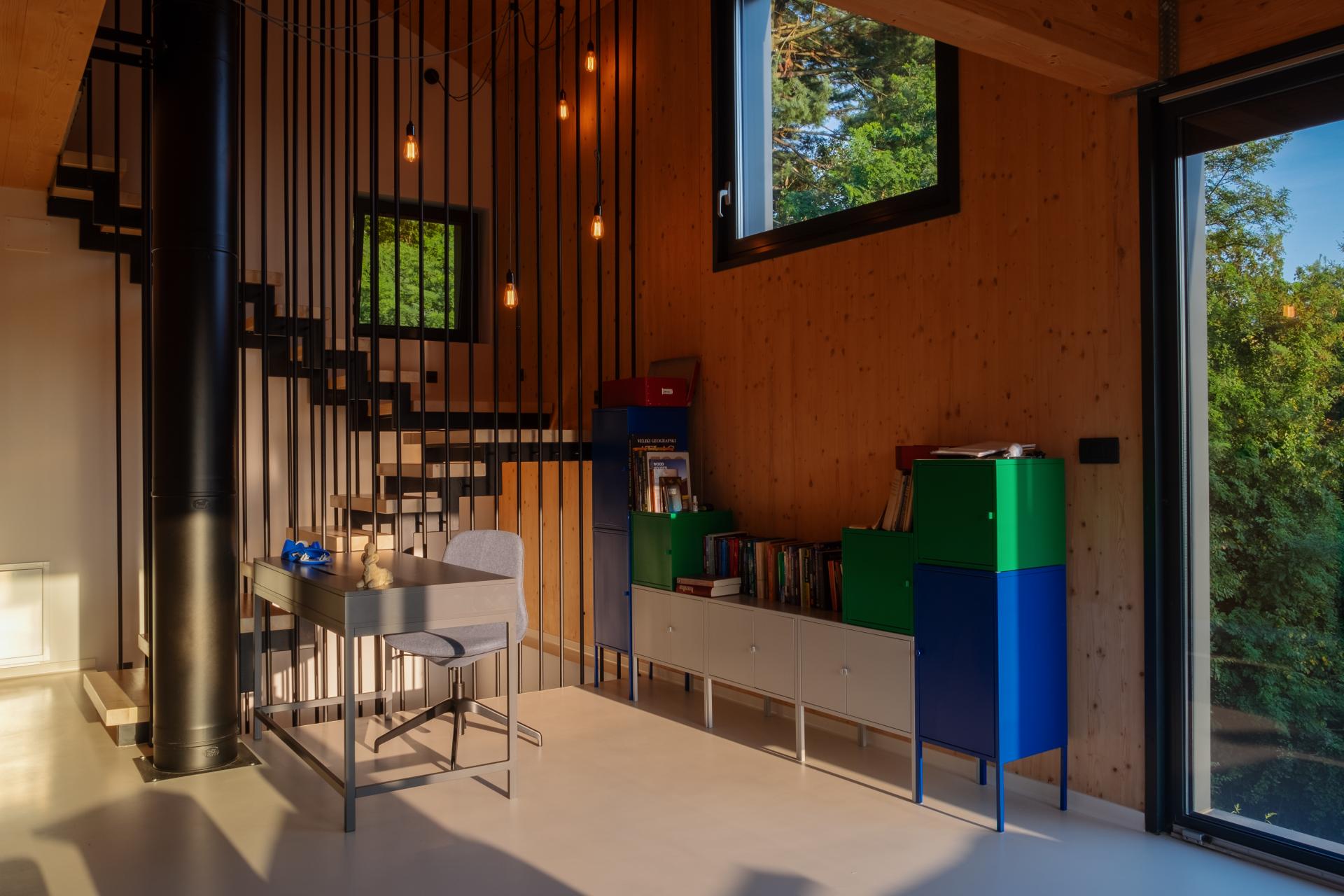
Though this natural exterior helps the Zagorje wooden house blend into the rural and rustic environment where it sits, no cliched olde worlde concessions ruin the interior – it is thoroughly modern. Exposed wooden walls surround laminated floors, on which cool and contemporary furniture is placed. Lighting is bold and basic, granted an industrial feel by exposed cables. The interior design is minimal and modern, airy, open and full of light. Large windows help the family connect to nature as they intended.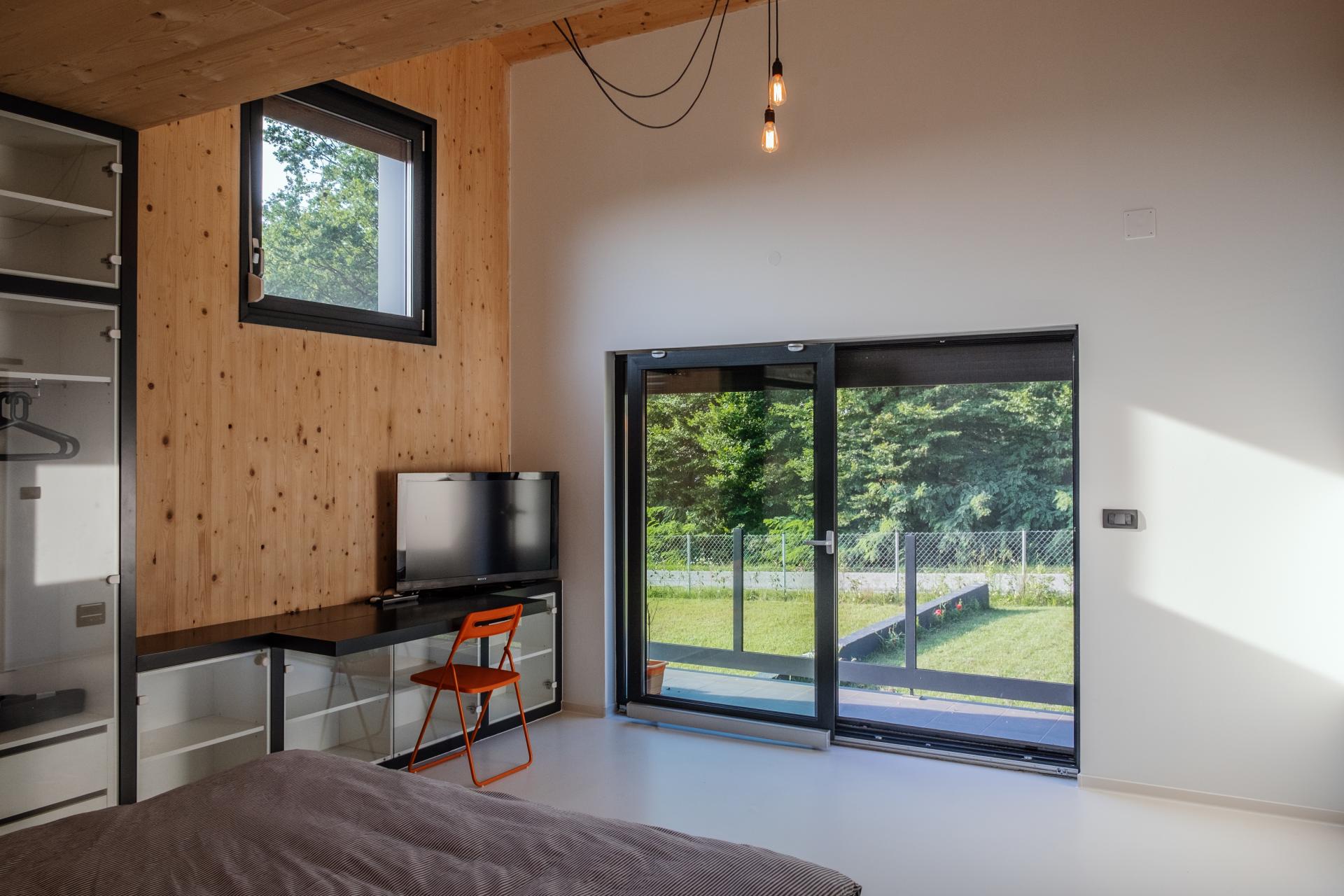
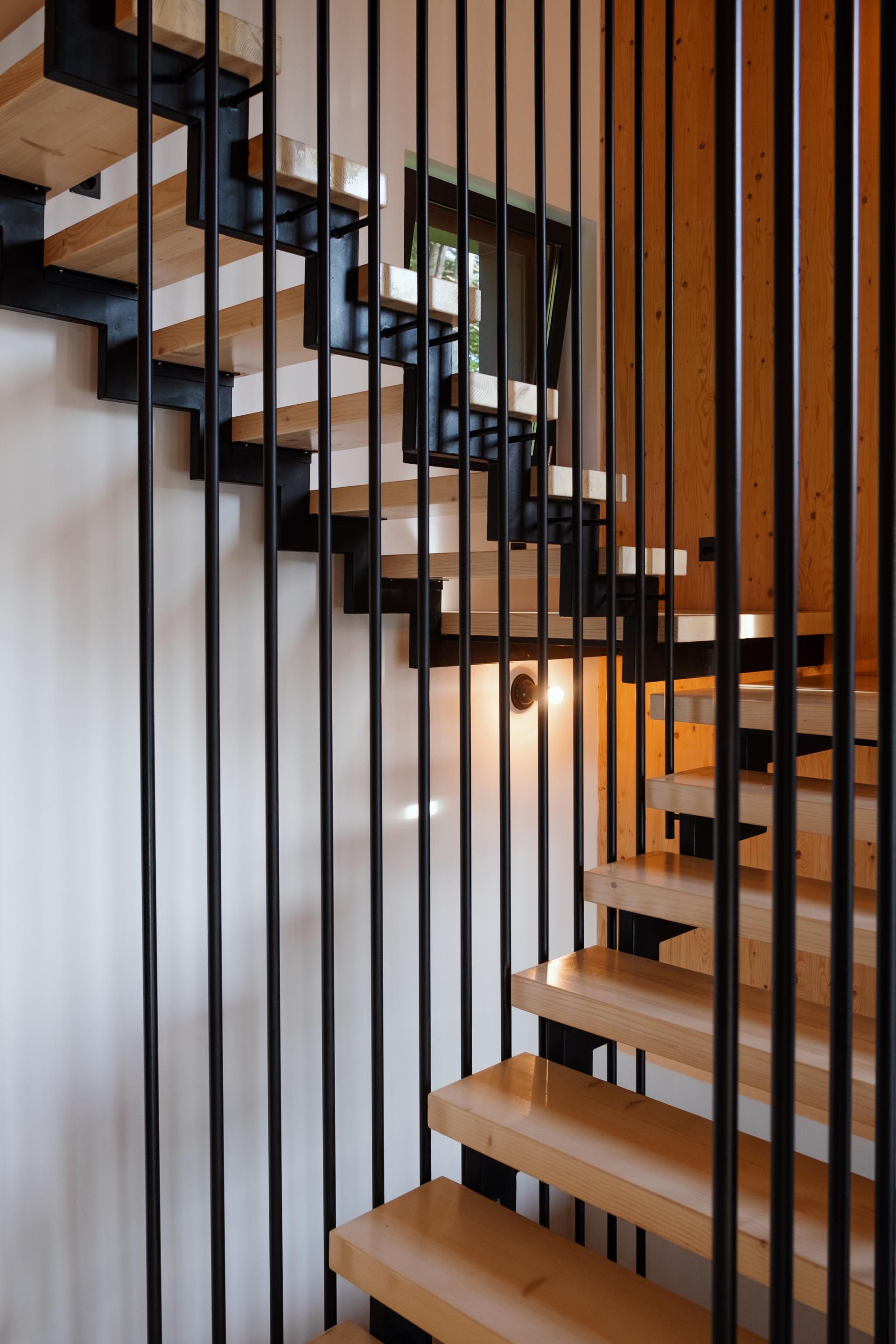
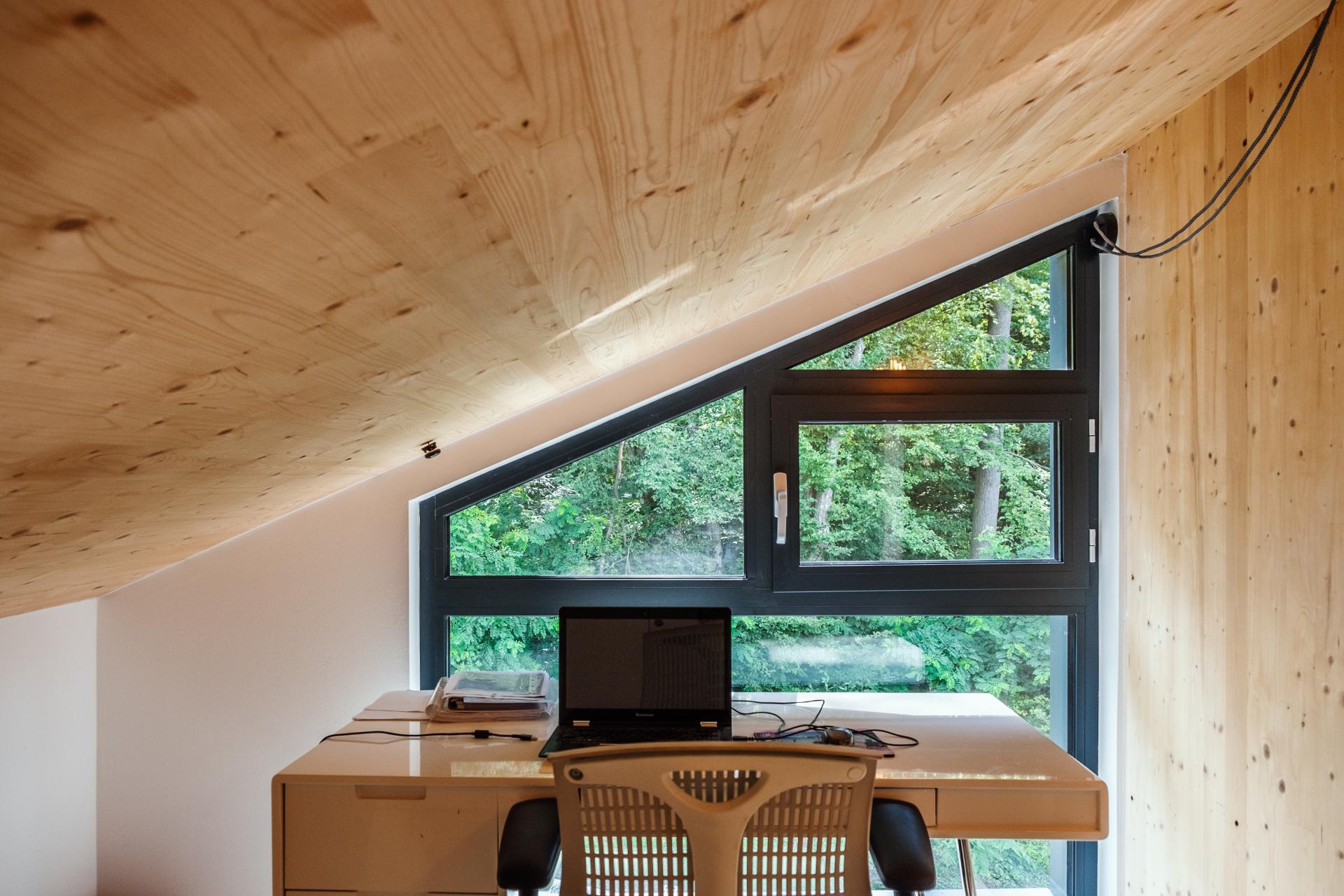
The house has three bedrooms with en suite bathrooms, a library, a space specified for working from home, a dining room, kitchen, laundry and a living room that leads out directly to a covered outside area, which can be used for hosting and dining in the warmer months.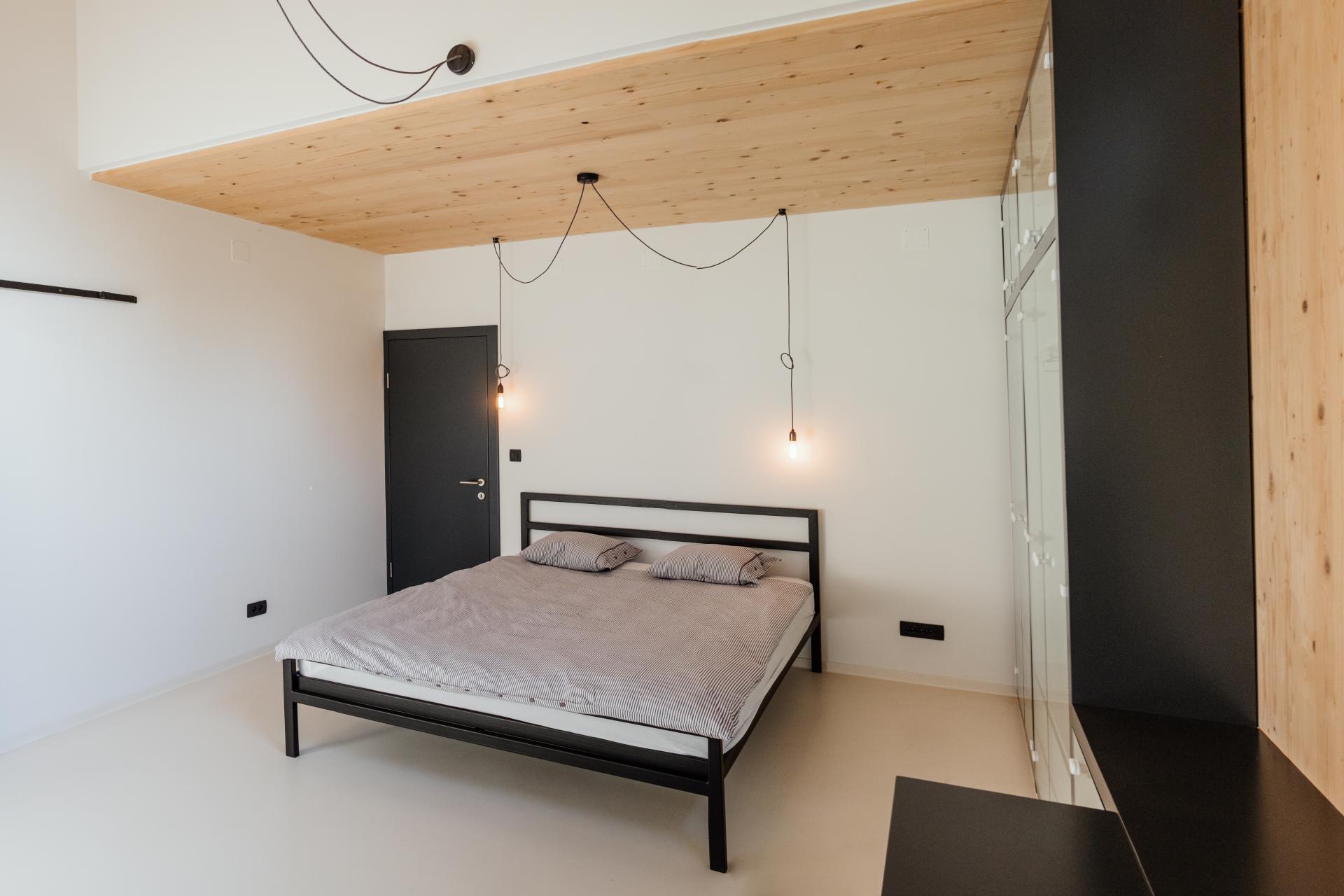
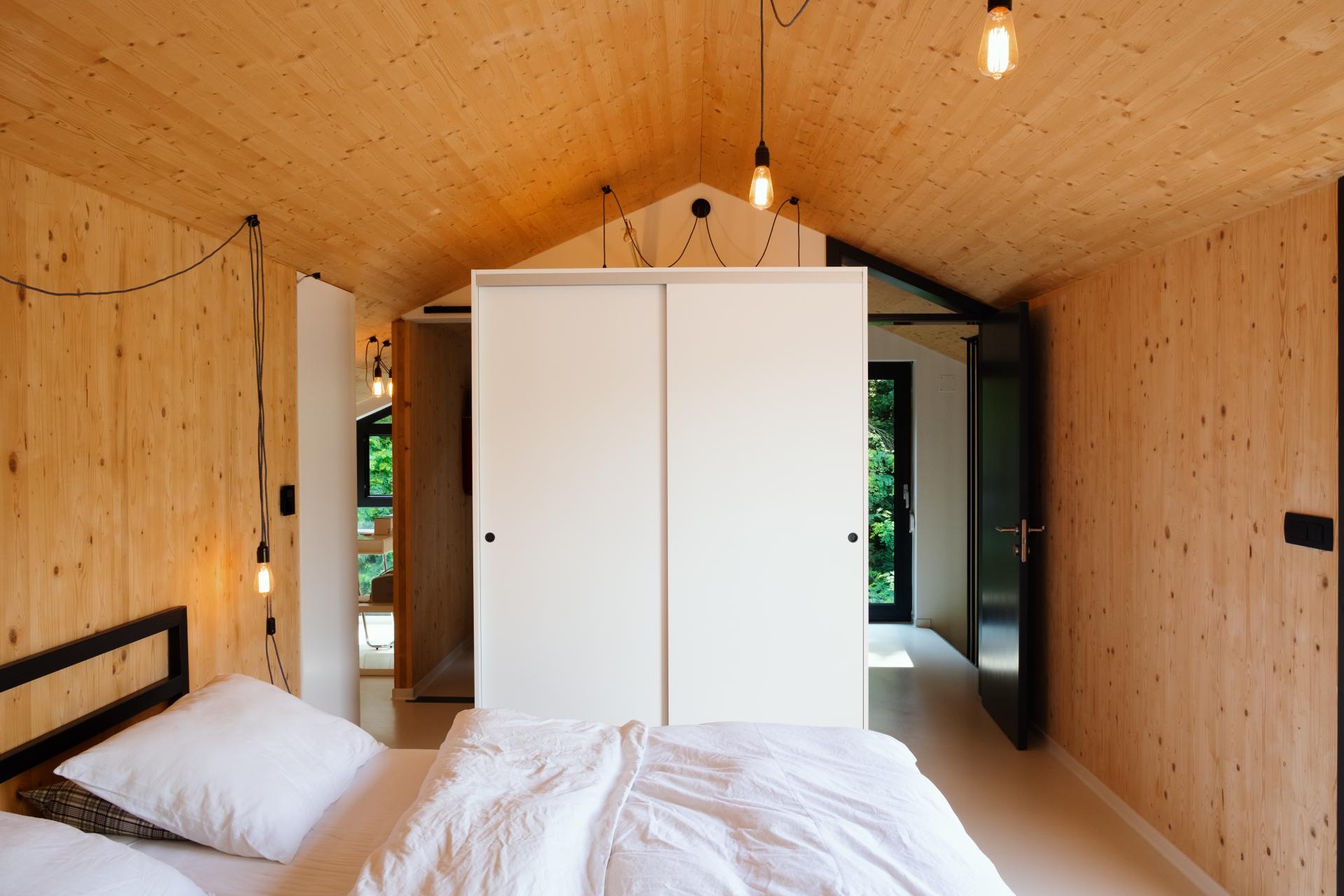
All images of the house © Lara Žitko. Architectural and design details were taken from an article by Jutarnji List home and design correspondent Jelena Cvetko
RegioJet Announces Direct Train from Prague to Rijeka and Split
February the 4th, 2021 - RegioJet has announced a direct train line from the Czech capital of Prague to the Northern Adriatic city of Rijeka, and even further down to Split in Central Dalmatia.
As Poslovni Dnevnik/Sergej Novosel Vuckovic writes, if Croatia's tourist authorities and workers are still somehow in two minds about what kind of visitors we should encourage in order to save the summer season this year, the answer is already coming from the Czech Republic - by train. The local railway company RegioJet has announced that it will continue to directly connect Prague with the Adriatic, a route which it introduced last summer, but with an important twist - in addition to Rijeka, the company's trains will run down to Dalmatia, more precisely to Split.
According to the Czech portal Zdopravy, RegioJet will connect the Czech capital and the Dalmatian city by train for the first time since way back in 2009 - the starting point is Prague and after Zagreb the first station in Croatia is Ogulin, from where trains will split - one will continue to Rijeka and the other will go to Split. From there, there are buses available that can drive further, even to neighbouring countries such as Montenegro or Bosnia and Herzegovina.
The timetable hasn't changed when compared to last year, when from July the 1st, Czech (and even Slovak tourists) filled almost every train in order to reach their favourite Croatian shores. Departure is at 17:00 from Prague, then from Brno and Bratislava, it arrives in Rijeka in the early morning the next day, and in Split early in the afternoon the same day.
RegioJet's Prague-Rijeka-Split line will operate every day during the two main summer months (July and August), and in June and September it will be offered three times a week - on Fridays, Sundays and Tuesdays.
RegioJet is already advertising a new service on its website, emphasising, with a red heart and the Croatian flag, that one can go to Split without the need for any transfers and that "a holiday by the sea has never been so easy".
The pre-sale of tickets starts this month, prices will be the same as last year, ie 590 Czech korunas for a one-way ticket in a compartment and 790 for the same journey but with sleeping arrangements included. The composition should consist of 15 wagons for a total of more than 650 seats, and the ticket price includes breakfast, WiFi access, bicycle transport, with the possibility to book the whole coupe for four people for the price of three.
"We're glad that we can lead people to positive ideas related to summer and a great summer holiday in Croatia," said Radim Jancura, the owner of RegioJet, as reported by the aforementioned Czech portal.
Last year, RegioJet transported more than 60,000 passengers in both directions in this way, ensuring that they could go to the Croatian coast relatively easily and without obstacles and border controls due to the pandemic. Only a negative coronavirus test is needed. The average occupancy of the lines was 90 percent, and it isn't unbelievable that this score will be exceeded this year.
In addition to coastal destinations, RegioJet will also offer direct connections to Zagreb from the summer, and will also bring guests from the Hungarian capital of Budapest to Croatia. For Czech tourists, rail transport also makes it easier to search for accommodation, offering half-board arrangements in some hotels, thanks to cooperation with agencies and tour operators.
For the latest travel info, bookmark our main travel info article, which is updated daily.
Read the Croatian Travel Update in your language - now available in 24 languages.
Swedes Continue Trying to Sell Gripen Aircraft to Croatia, Ready to Lower Price
February the 4th, 2021 - The Swedes are continuing to try to sell their Gripen aircraft, about which there has been a lot of talk for months now, to Croatia. They're even ready to lower the price even more.
As Poslovni Dnevnik/Darko Bicak writes, after the ad hoc Advisory Interdepartmental Commission for the Procurement of a Multipurpose Fighter Aircraft was submitted to the Croatian Government in mid-December last year, it submitted a "Feasibility Study for the Procurement of a Multipurpose Fighter Plane (VBA)".
Although the Commission was expected to reach a conclusion that the government would then only confirm, possibly seeking Parliament's approval afterwards - as was the case with the last tender in which the Israeli Barak was selected, the conclusion was that the body considered the optimal choice to be the used French Rafale aircraft, and for the new American F-16 Block 70/72. Therefore, a decision was made that there is no decision, and that the responsibility for the choice has now been transferred to the Croatian Government, although it was confirmed that all of the offered aircraft fully meet all Croatian technical and tactical needs.
An offset of one billion euros
As expected, a used Israeli-American F-16 Barak dropped out of the game because it was clear to everyone even before the tender that the offer was meaningless. The reason for this is the previous unsuccessful purchase of that aircraft from Israel, as well as the fact that these are temporary aircraft that would be about 40 years old at the time of delivery to Croatia.
That this was clear to everyone is also showcased by the fact that Israel didn't actually lobby for its planes, and the Americans submitted their offer for the sake of keeping order.
A much bigger surprise was the write-off of the Swedish Gripen aircraft, although it was obvious at the beginning that almost all of the bidders are strong players, some in a geopolitical sense and some in an economic sense, and that any losers could cause some problems in the political and economic global arena. Although it's clear to everyone that the Rafale and F-16s are larger and more powerful, and of course more expensive fighter jets than the Swedish Gripen aircraft, the Swedes are the only ones who have made a concrete offer for economic cooperation with Croatia.
Among other things, in an interview with Poslovni Dnevnik, those at the helm of Saab, the manufacturer of the Gripen aircraft, and the Swedish arms agency FMV, said they were ready to invest half of the total price of the Gripen aircraft into the Croatian economy. If it's known that the basic price of these Gripen aircraft stands at around one billion euros, and the costs of its maintenance, armament and use would be the same, it's clear that the Swedes would invest around one billion euros in Croatia in some form of offset.
The Americans offered cooperation with six unspecified Croatian companies that the F-16 aircraft manufacturer, Lockheed Martin, would include in its global supply chain. In addition to the F-16, the company also produces F-22 and F-35 fighter jets, as well as C-130 Hercules and C-5 Galaxy transport aircraft, and has other missile and space divisions too.
France's offer is the biggest mystery of all. Although in unofficial talks with military officials and other bidders, one may get the impression that the Rafales are the favourites of the Croatian Government, nothing is publicly known about their offer, both in a financial sense with regard to the aircraft, weapons and equipment, nor about about possible reverse economic cooperation or offsets.
A campaign in Brussels
Over recent, semi-official information has been circulating in the public eye, which no one wants to officially comment on, and that's that the Swedes allegedly aren't intending to give up with their Gripen aircraft offer to Croatia easily because they're convinced that the Croatian tender has been rigged.
Namely, the Swedes, according to that source, are allegedly offering Croatia a loan with zero percent interest and a two-year grace period to pay the first installment of the loan. Reportedly, they're ready to lower their current price of 900 million euros for the entire package (aircraft, equipment, weapons, training and logistics). On the other hand, according to that same source, a campaign is planned to be launched in Brussels due to the alleged promotion of one bidder by HDZ.
Alleged ''proof'' of this is offered by the fact that the ruling HDZ newspaper has, in the past, published unsigned ''fan articles'', for which it isn't entirely clear whether they were paid or journalistic, in which the Gripen aircraft and the Swedish offer were apparently ''satanised''.
It's therefore very difficult to say what will happen next in the seemingly endless Gripen aircraft, Croatia-Sweden story, but it is certain that a lowered price will be of interest to some.
For the latest travel info, bookmark our main travel info article, which is updated daily.
Read the Croatian Travel Update in your language - now available in 24 languages.
Internationally Successful Croatian Highlander Brand Gains First Investor
February the 4th, 2021 - The Croatian Highlander brand has gained international recognition and praise, and now money has been placed where the mouth is in the form of the brand's very first investor.
As Poslovni Dnevnik writes, the Croatian Highlander brand is an interesting new mountaineering experience, created by a team of recreational mountaineers and nature lovers from the Eastern Croatian city of Osijek, who recognised the beauty of Croatia in its stunning mountain peaks and roads.
"Highlander is an adventure of a lifetime" - say the organisers Igor Mlinarevic, Jurica Barac and Andrej Mlinarevic, three friends from Osijek, who first devised a 104-kilometre route that takes mountaineering participants through the most beautiful parts of Velebit through two National Parks - Northern Velebit and Paklenica, in order to expand the project to other countries from year to year. And they are immensely looking forward to new challenges and adventures.
At the end of last year, the Croatian Highlander programme for 2021 was officially presented in one of the most impressive locations in the world - in front of the Egyptian pyramids in Giza, not far from Cairo, which attracted the attention of many media outlets, bringing this Croatian brand to as many as fifteen countries.
After an impressive announcement from Egypt, Highlander got its first investor, entrepreneur Ivan Vrdoljak, known to the general public as a former politician, although he left politics a few years ago, writes Vecernji list. Vrdoljak, who is also from Osijek himself, recognised the great potential hidden in it, but also the fact that it is being developed by a young team of people from his own hometown. The amount of the investment is currently being kept as a business secret, but what the organisers point out is that Ivan will be involved in Highlander's operational terms as a project partner.
"I see Highlander as a great Croatian product with fantastic global potential. I'm glad that my friends from Osijek have recognised me as a person who, with my knowledge and energy, can help them achieve their ambitious goals on a global level. Highlander unites everything that attracts me in business and what I believe is the work of the future, and that's the preservation of nature and the health and satisfaction of people,'' said Ivan Vrdoljak.
"I'm extremely glad that Ivan Vrdoljak, also from Osijek, made this decision and decided to support the Highlander project. We're at the very beginning of the development of global business and investment collection and I'm sure that Ivan, with his rich experience and knowledge, will significantly contribute to the development of the project, attracting other investors and smart management. We're facing a year of uncertainty in which we have to organise fifteen events in different countries together with our partners, but also a year in which we occupy the number one position in terms of a mountaineering event in the world. I'm proud of everyone involved in the project and I'm sure that we're going to continue with this step, and go even further,'' said Jurica Barac, CEO of the Croatian Highlander brand.
One of the most important goals of Highlander is the promotion of an active and healthy lifestyle through hiking, as well as the preservation and care of nature that we need to leave for generations as a legacy, promoting the so-called Leave No Trace philosophy, and the wish of the organisers is that in the future, Croatian Highlander events deserve the status of a ''100% Green Event''.
For the latest travel info, bookmark our main travel info article, which is updated daily.
Read the Croatian Travel Update in your language - now available in 24 languages.
Marko Velic Moves from Facebook's Machine Learning to Photomath
February the 4th, 2021 - Marko Velic has moved from Facebook, at which he has worked for he past two years, to Photomath.
As Novac/Jozo Vrdoljak writes, The team of the world's most popular mathematical application (app) Photomath was recently made richer by the arrival of Marko Velic as the leader of the team for the development of artificial intelligence. Marko Velic has very extensive experience in the field of artificial intelligence (AI) and the application of machine learning. He has worked for the Facebook Machine Learning team in the British capital of London for the last two years, while before that he was the head of the machine learning team at Styria.AI for four years.
With the acquisition of Marko Velic, Photomath has confirmed its intention to attract a growing number of renowned engineers, web and mobile application development experts and those from the field of machine learning. Since developing the app back in 2014, the company has grown to over 100 employees, while the number of users has exceeded an incredible 220 million.
''I've been following Photomath for years and I know that it has all the prerequisites for success - a top product, an exceptional team and an excellent understanding of the market and business. Since the field of machine learning in solving mathematics is still insufficiently researched, Photomath is an ideal ''playground'' for research and work in the field of artificial intelligence,'' said Marko Velic of his move, who is previously known to the Croatian tech and business public for his achievements in the field of artificial intelligence, for which he received his doctorate. He is also the author of several patents.
Damir Sabol, founder and CEO of Photomath, added that the main factor in their global success is having extremely talented employees who are alwas eager to learn more in a stimulating atmosphere.
''Our ambitions continue to grow and our goal is to invest in the development of artificial intelligence technologies that will be the foundation for hitherto unimaginable learning application possibilities. Bringing in Marko Velic from Facebook is a significant step towards that goal, as well as the future acquisition of top AI engineers here on the Croatian market,'' concluded Sabol.
For the latest travel info, bookmark our main travel info article, which is updated daily.
Read the Croatian Travel Update in your language - now available in 24 languages.
A Foreign Eye at UGP Croatian Entrepreneur Protest in Zagreb
February 3, 2021 - Thousands descended on Zagreb's main square this morning for the UGP Croatian entrepreneur protest. TCN was there with a foreign eye.
It was a feeling I have not had for 25 years. Walking to the event with a sense of anticipation, with everyone else walking in the same direction. It took me right back to 1996, the last year I had a season ticket at Villa Park to watch Aston Villa. Most of those walks of anticipation to watch Villa ended in disappointment. Would this too, my first attendance at a protest in Croatia?
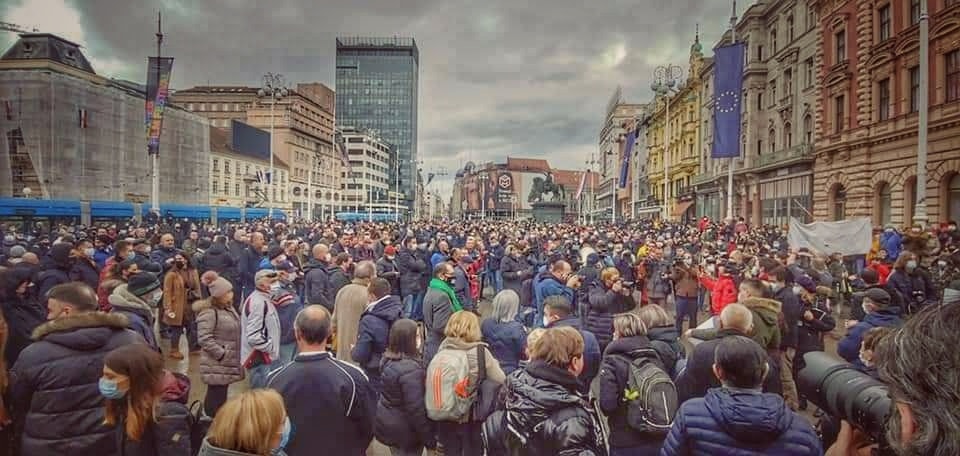
In truth, I was not sure to expect. Permission to hold a protest by the Voice of Entrepreneurs Association (UGP - Udruga Glas Poduzenika) had not been granted, and so a call to action was issued instead, inviting entrepreneurs and the public to come to the square and voice their grievances on air via a live stream by the Johann Franck cafe on the corner of Ban Jelacic square.
After weeks of inconsistent measures and double standards, followed by the arrest and alleged fining of a gym owner for opening his gym earlier this week, frustration has been growing among the entrepreneur community in recent weeks, and UGP has become a focal point both for raising the concerns of its entrepreneurial members, as well as demanding appropriate economic measures and a lessening of the parafiscal burden.
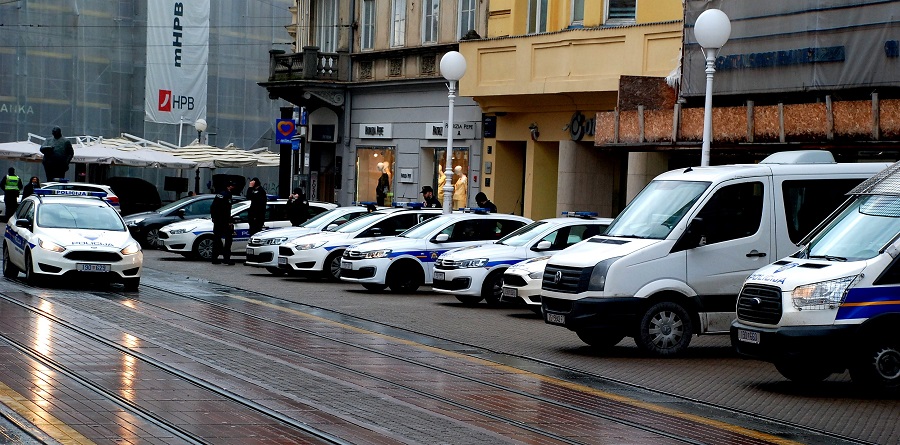
As expected, there was a police presence, but it was at a distance. The entrepreneurs came in peace wanting to makes their voices heard, and I don't think there was any expectation that there would be any trouble. In any event, there was none.
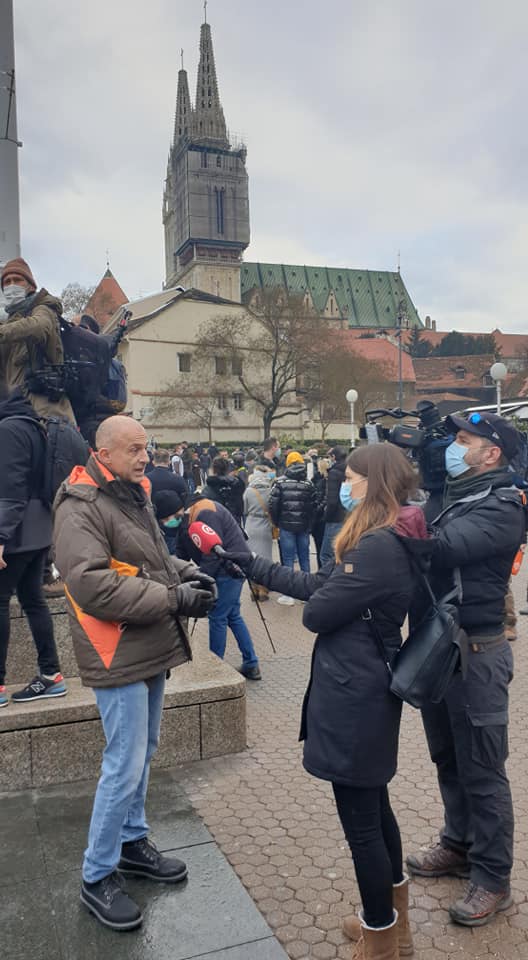
While the police presence may have taken a back seat, there was a sizable Croatian media presence, with this man very much in demand - Andrija Klaric, the 51-year-old gym owner who was recently released after being arrested for opening his gym. More on that story in Gym Owner Released from Custody, Called on Prime Minister to Resign.
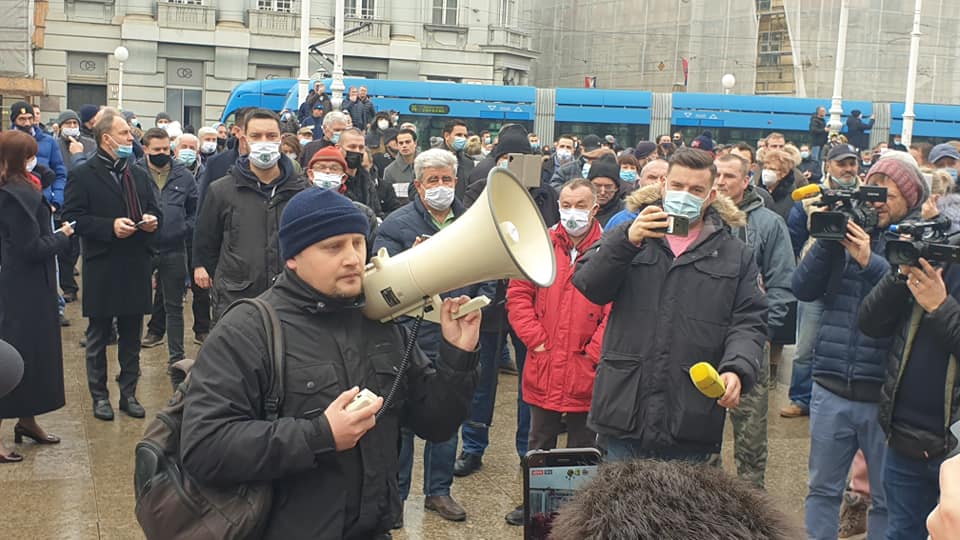
After weeks of closed cafes and restaurants and very little 'normal' social life, the gathering performed different functions for different people. For some, it was an opportunity to vent their frustrations via megaphone and chanting. Others were clearly enjoying the social aspect of it all, catching up with friends from other parts of the country with a drink or two. The frustration was ubiquitous, the methods of expressing it varied.
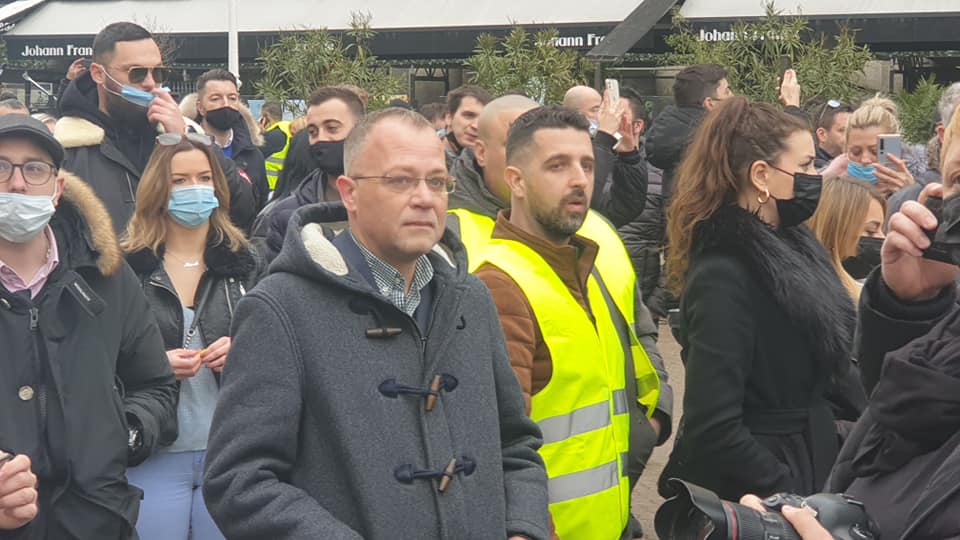
Former Minister of Culture Zlatko Hasanbegovic was among those in the crowd.
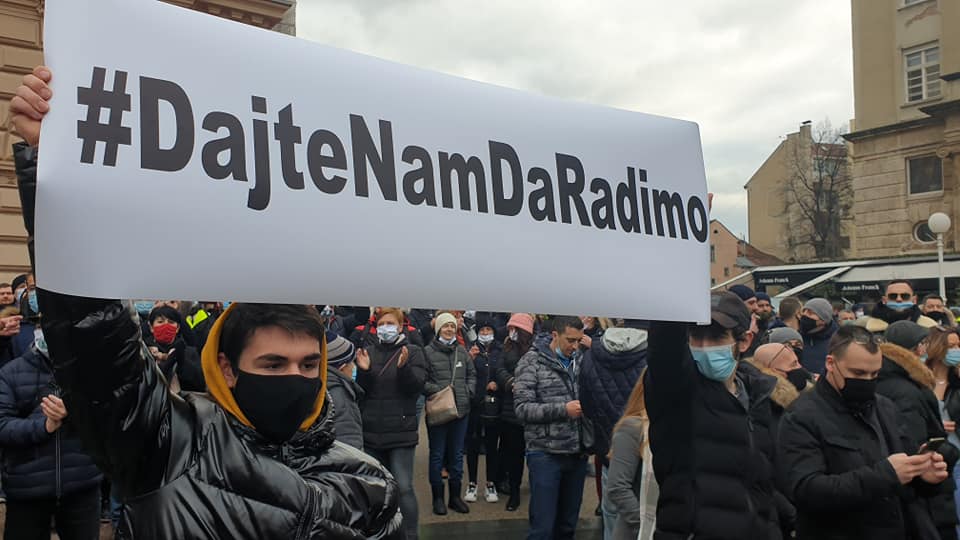
The messages were simple - Just let us work. Cafes, gyms and restaurants remain closed in Croatia, while it is ok to buy a takeout coffee from a bakery, but not a cafe, then sit on a park bench next to a closed cafe terrace. Read more in As Gym Owner Faces Prison, the Virus Must be Laughing at Croatia's Inconsistent Measures.
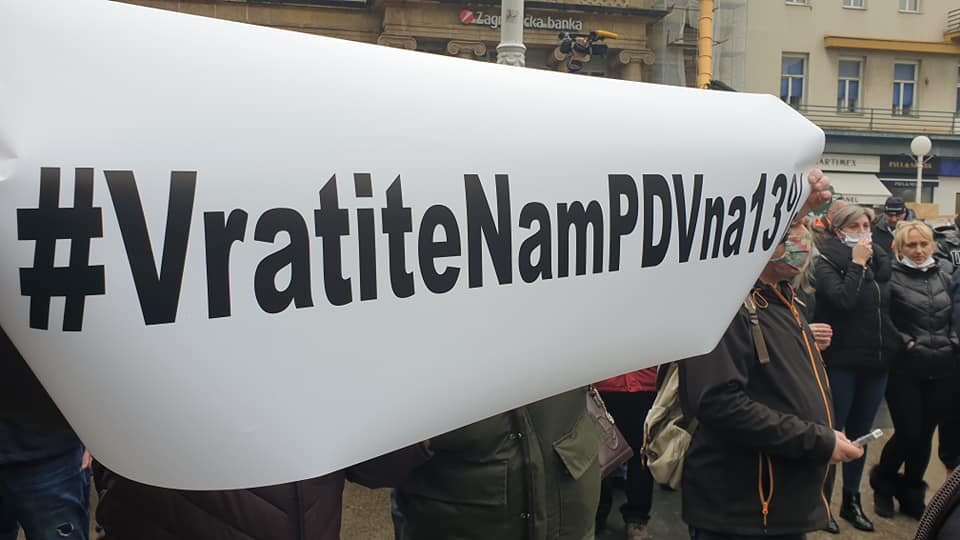
Return VAT to 13%. At 25%, Croatia has the second-highest VAT rate in the EU after Hungary.
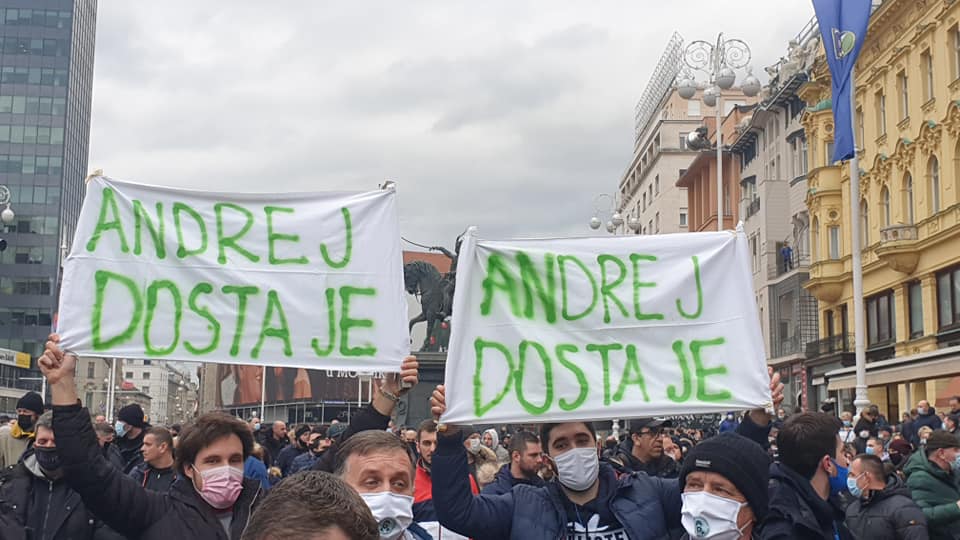
Enough Andrej. A reference to Prime Minister Andrej Plenkovic.
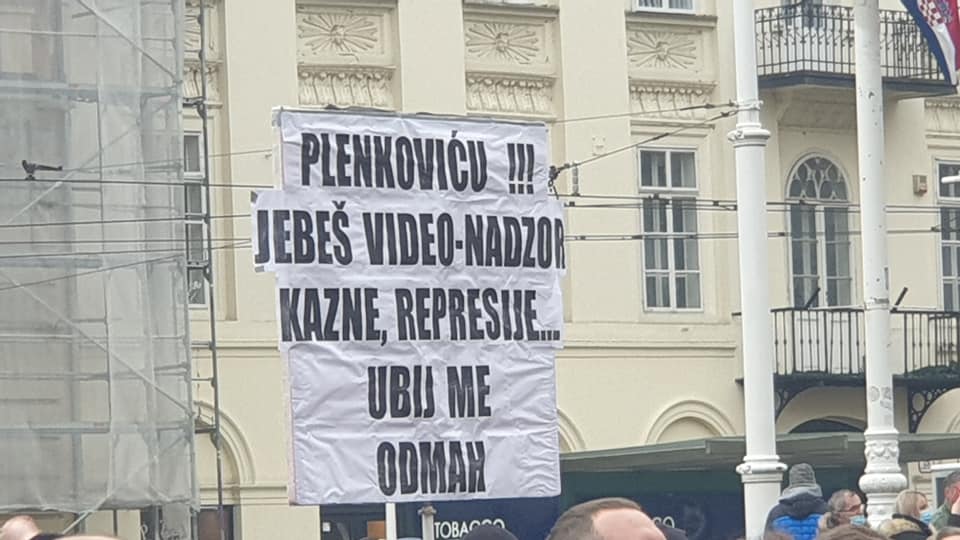
Plenkovic: F*** video surveillance, fines, repression... just kill me now.
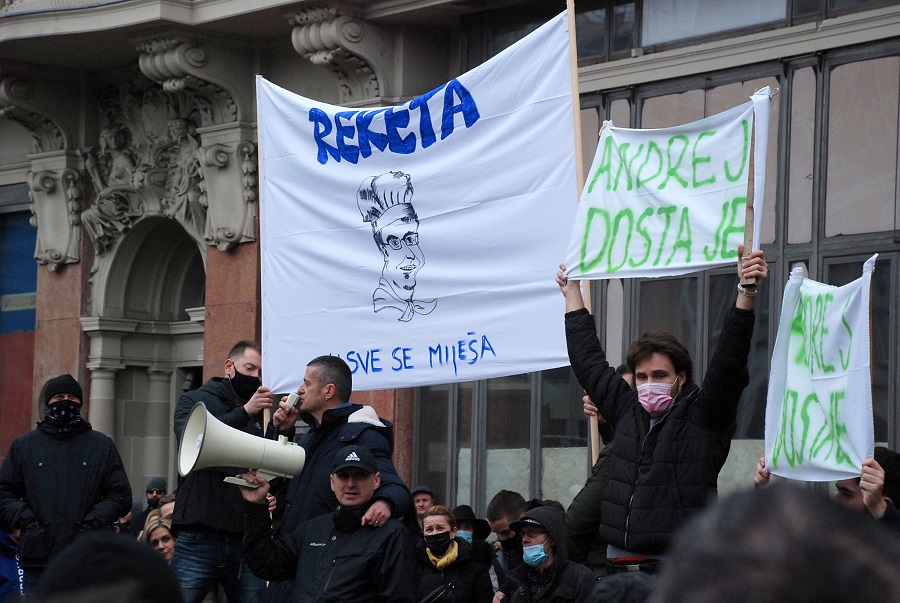
Racketeering: it mixes in everything. A depiction of Plenkovic and the slogan of leading Croatian food seasoning condiment, Vegeta. Podravka, the company which makes the world-famous brand, yesterday presented Plenkovic with his own branded Vegeta. It coincides with the appointment of Martina Dalic, Plenkovic's former Deputy Prime Minister, as the new head of Podravka. Dalic was forced to resign due to the Agrokor scandal a couple of years ago. 'It mixes in everything' is the Vegeta slogan.
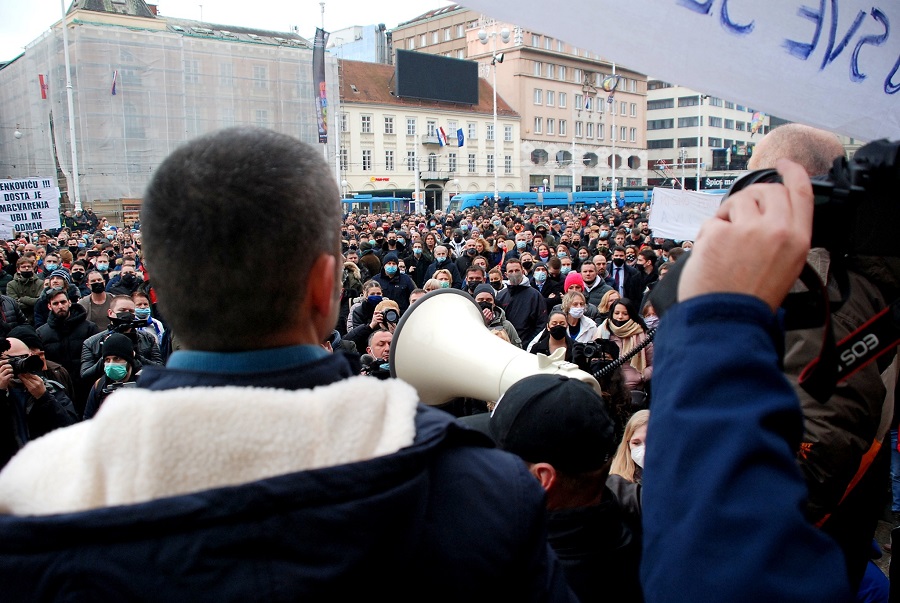
The UGP plan of events to form a line to give statements to the live feed was somewhat hijacked by other attendees, some of them with megaphones, who came to give their own messages and to vent their frustrations. Drazen Orescanin, one of UGP's founders, encouraged people to express themselves by giving statements to the live feed, which was the original plan.
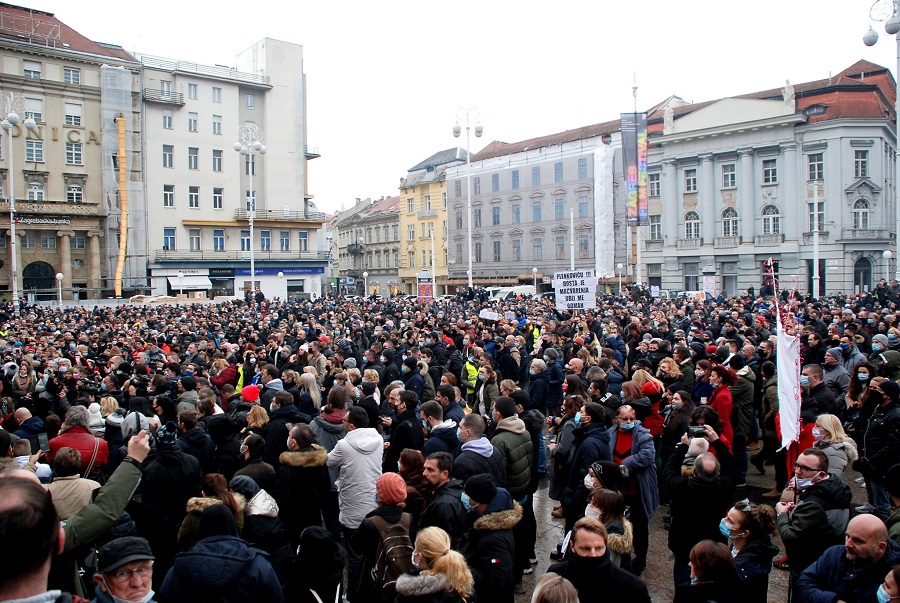
So how many people showed up? I haven't seen an official number yet, but it was certainly in the thousands and more than the 1-2,000 that UGP had been expecting. Half of the square ws reasonably full, and I think about 5,000 would be a good estimate.
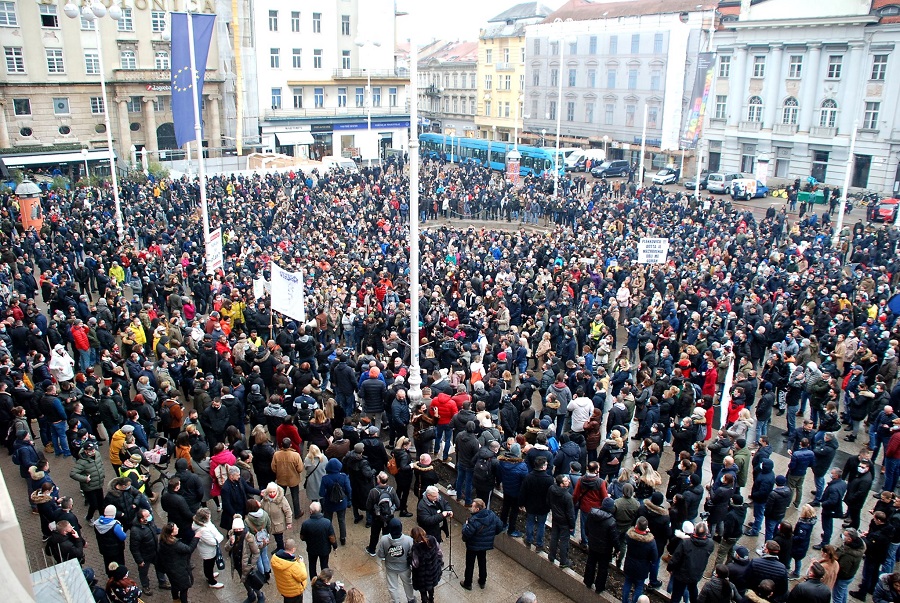
Most wore masks, but by no means all.
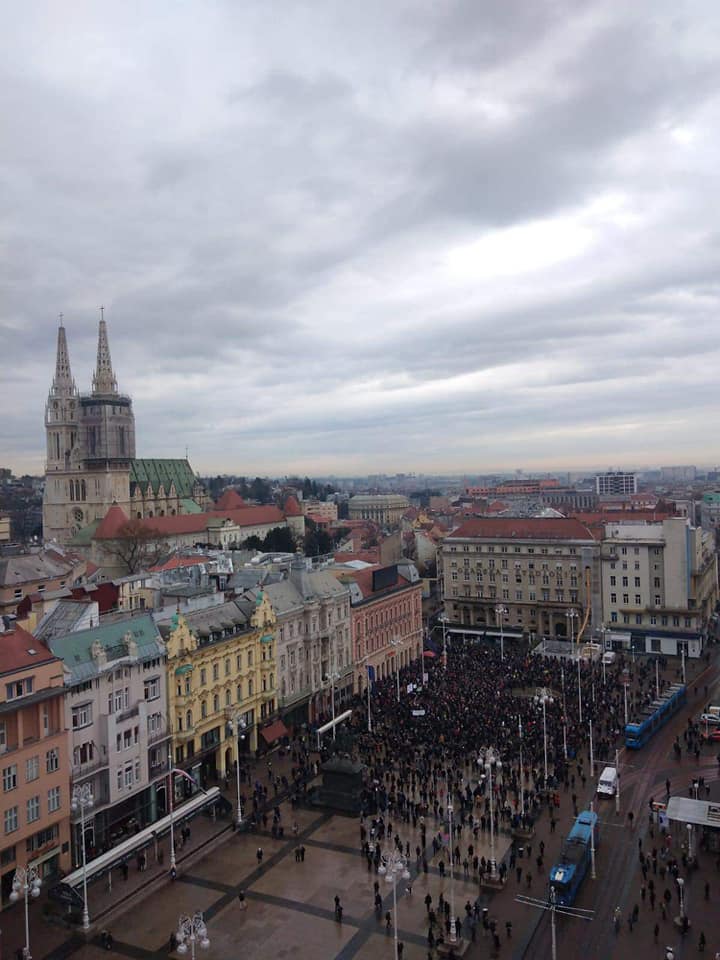
A view from a taller building on the other side of the square gives a different perspective.
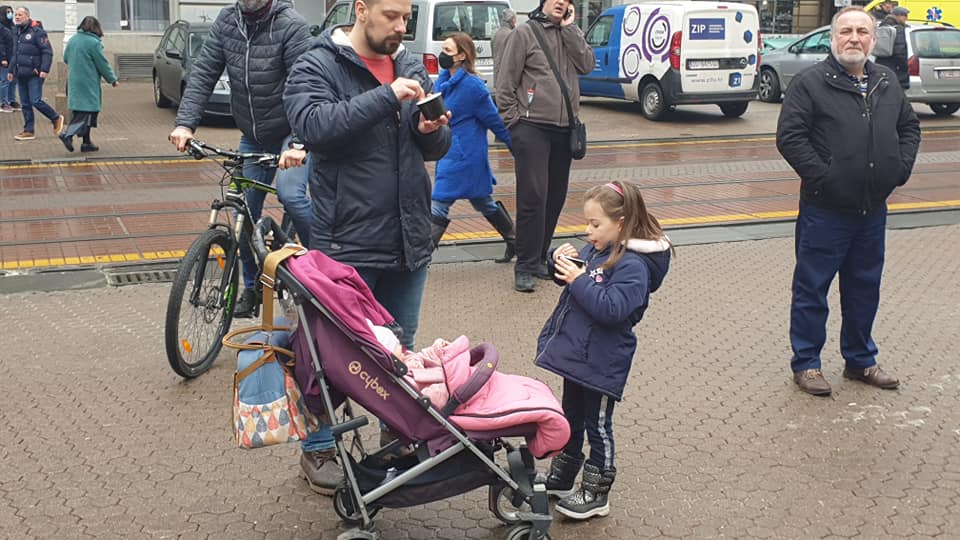
And not everyone was focused 100% on the protest, for there was ice cream to be had, even in this colder weather.
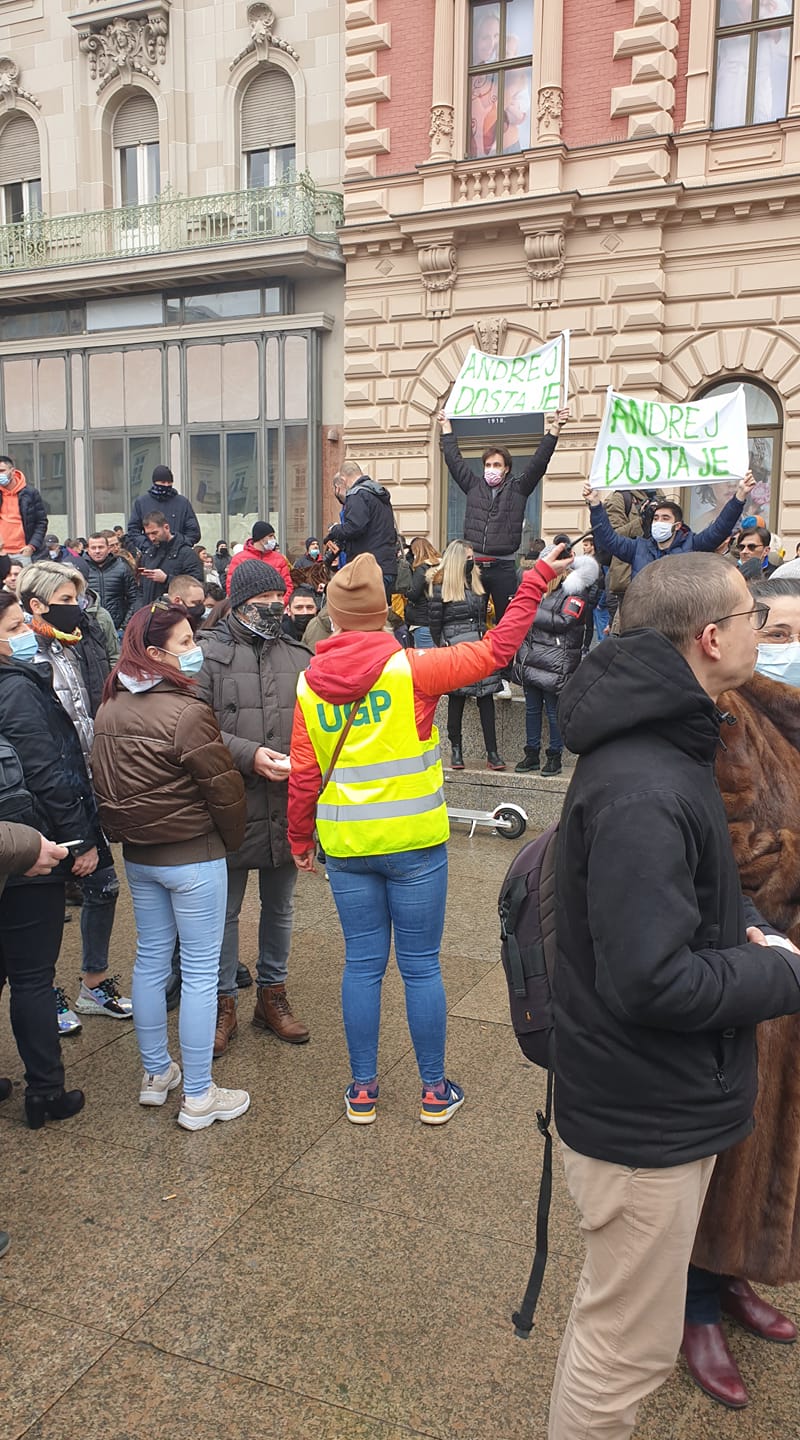
UGP had their volunteer marshalls helping things along.
As I looked around, I saw a lot of angry and frustrated people, but also a lot of exceptional people who have the potential to make a great difference in Croatia. Several of Croatia's leading entrepreneurs were there - and how many more leading entrepreneurs would there be if this wealth-creating sector of society were treated less as the enemy, and instead encouraged to grow with progressive rather than regressive taxation and red tape.
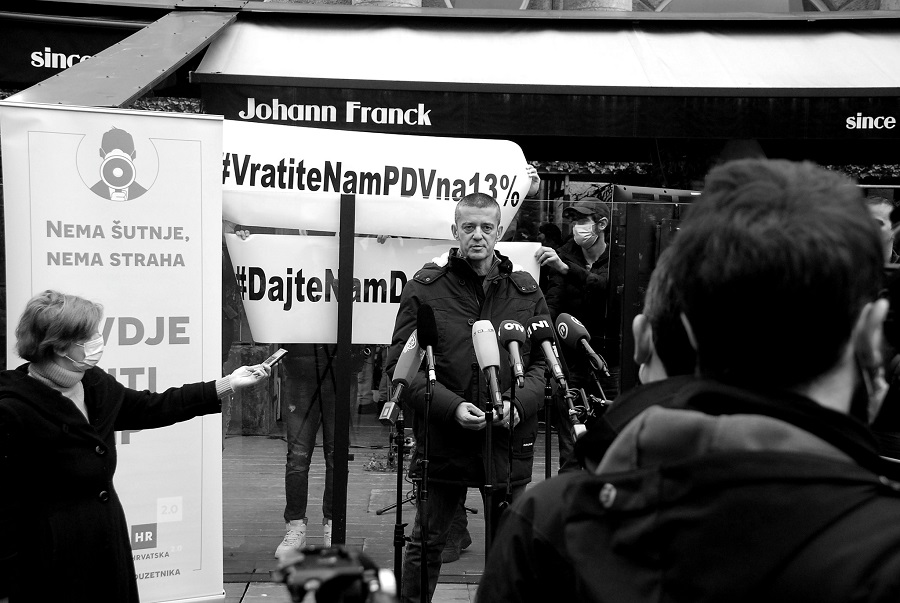
Orescanin was a focal point for the media the entire time (and he kindly found time for a TCN interview in English, which we will be adding to the end of this article as soon as it is edited), but he was not the only one.
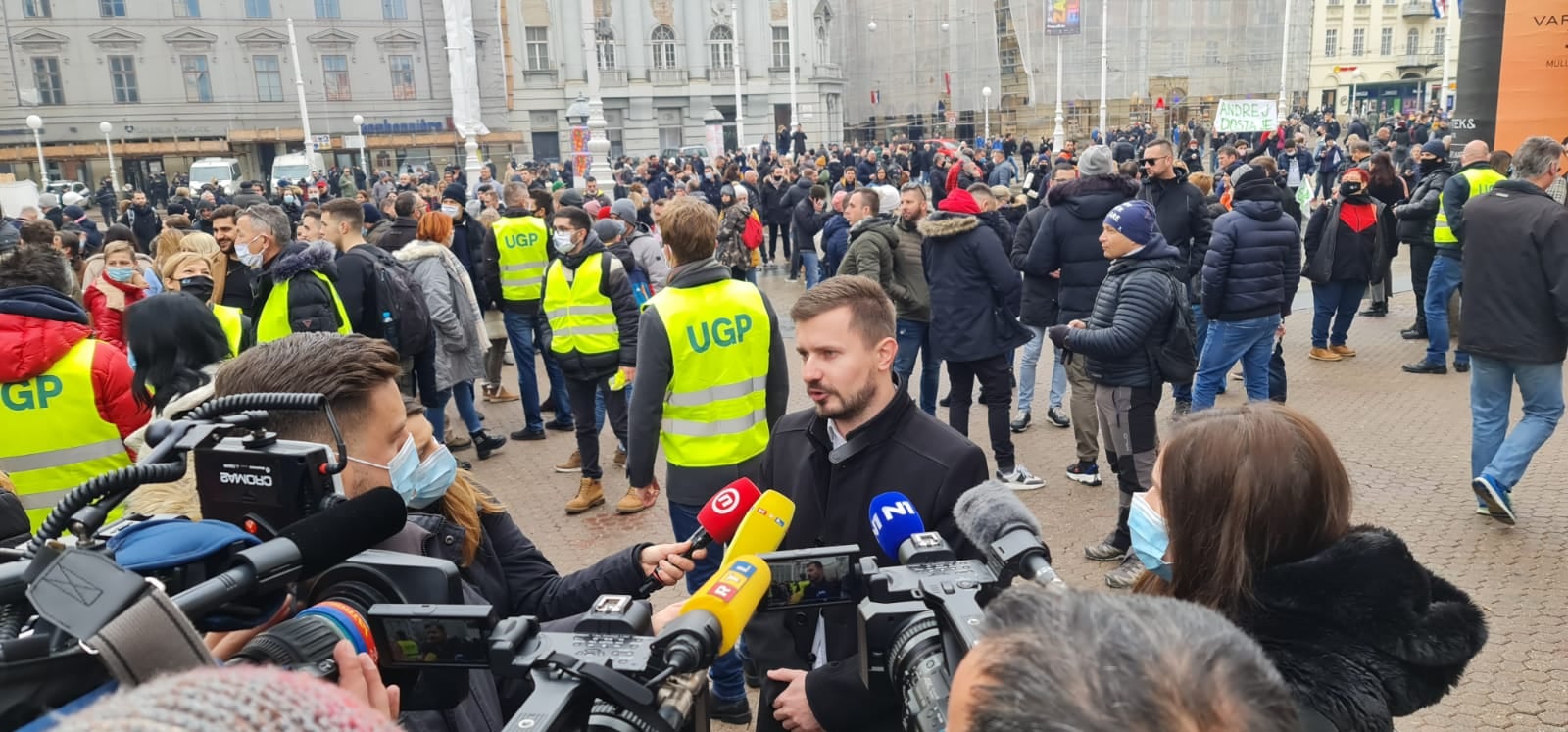
It was nice to bump into familar faces, including the two men from Sveta Nedelja who have provided a blueprint of how administration can work in Croatia, and how encouraging entrepreneurs with tax cuts and incentives, rather than burdening them with yet more obligations, can have the right results. Mayor of Sveta Nedelja Dario Zurovec and his (until recently) Deputy Mayor Davor Nadji, have succeeded in 3 short years where others have failed.
In an age of emigration, economic downturn and rising unemployment, under their guidance, 20% more jobs have been created since 2017, the population of Sveta Nedelja has grown more than 10% since the last census, unemployment is an enviable 3.9%, and they have just introduced free buses for all - just one of many measures to improve the life of the people they serve. In addition to that, they run the most transparent and accountable administration in Croatia, slashing taxes for businesses. No wonder, perhaps, that Sveta Nedelja has been named best medium-sized town in Croatia for the economy for the last three years in a row, as well as one of the top 5 places in Croatia for quality of life. If you are interested in more on the Sveta Nedelja phenomenon, check out some of TCN's coverage.
Davor Nadji (talking to the press, above) is no longer the deputy mayor of Sveta Nedelja. He has formed a political party, Fokus, has taken his seat in Parliament, and is standing for election to be Mayor of Zagreb.
Seeing people like this at the protest wherever I looked was an overwhelming positive reaction to the day's events. While Croatia has its problems, it also has an abundance of very capable people who are fighting for a better Croatia. And if the current system can be changed, Croatia has a very bright future indeed, led by progressive people.
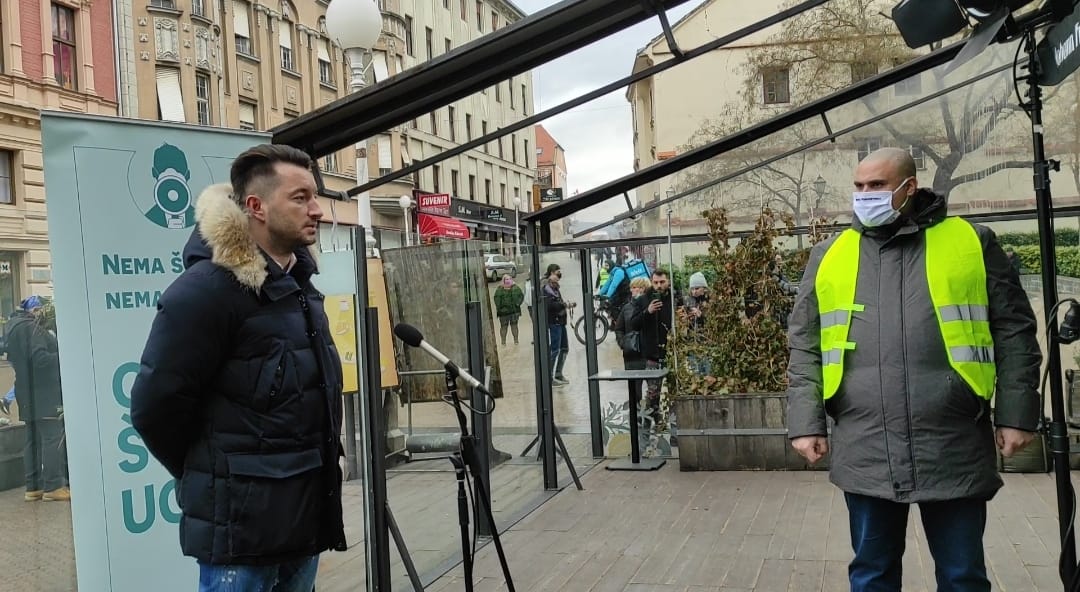
Meanwhile, back to reality. Entrepreneur after entrepreneur gave their input to the live feed.
This was not a protest about epidemiological measures, but rather about the injustice of the divide between the two Croatia's Orescanin described with UGP co-founder Hrvoje Bujas in an interview earlier this week - Bujas and Oreščanin: Why Should You Come to Zagreb Protest? Because There are Two Croatias.
UGP has been campaigning for months for the removal of the numerous parafiscal taxes that exist in Croatia. One major battleground has been the obligatory monthly payment of 42 kuna a month for small companies (more for larger companies) each business must pay monthly to the Croatian Chamber of Economy (HGK). After paying my mandatory contributions for 17 years now, I am still trying to figure out what exactly HGK does for businesses like mine. I documented my experiences with HGK a few years ago in Welcome to Uhljebistan: the Croatian Chamber of Economy, Beyond Useless.
The 42 kuna has become a symbolic battlefield, even more so after Prime Minister Plenkovic wondered why sort of entrepreneur would have a problem paying such a paltry sum each month - they are not entrepreneurs.
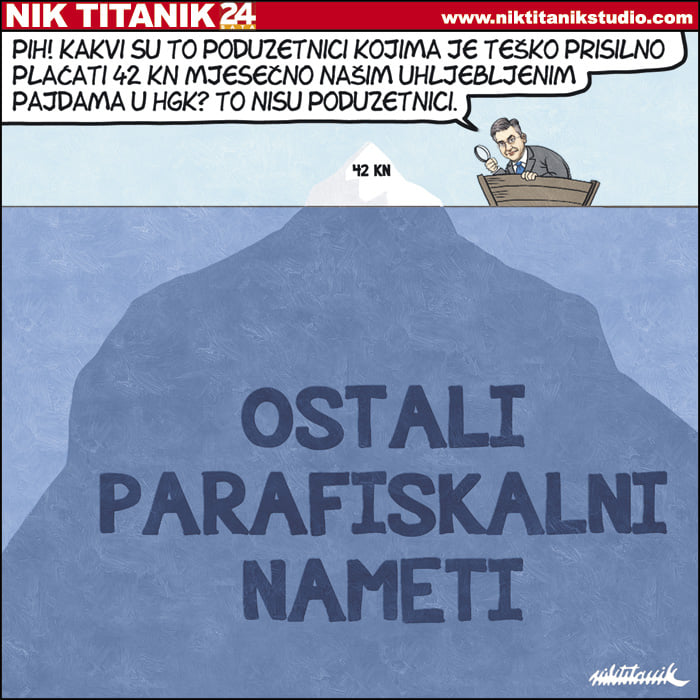
As legendary cartoonist Nik Titanik captured, the 42 kuna is just the tip of the iceberg of the parafiscal burden of Croatia's entrepreneurs.
If the 42 kuna each month was contributing to the greater good, then perhaps there would be less resentment, but HGK is one of many state institutions which is impervious to recession or crisis. For these are State institutions, and pay cheques are guaranteed.
Ask a local how HGK money gets spent, and it will not be long until you hear about the safari hunting successes of Nadan Vidosevic, who used to run HGK.
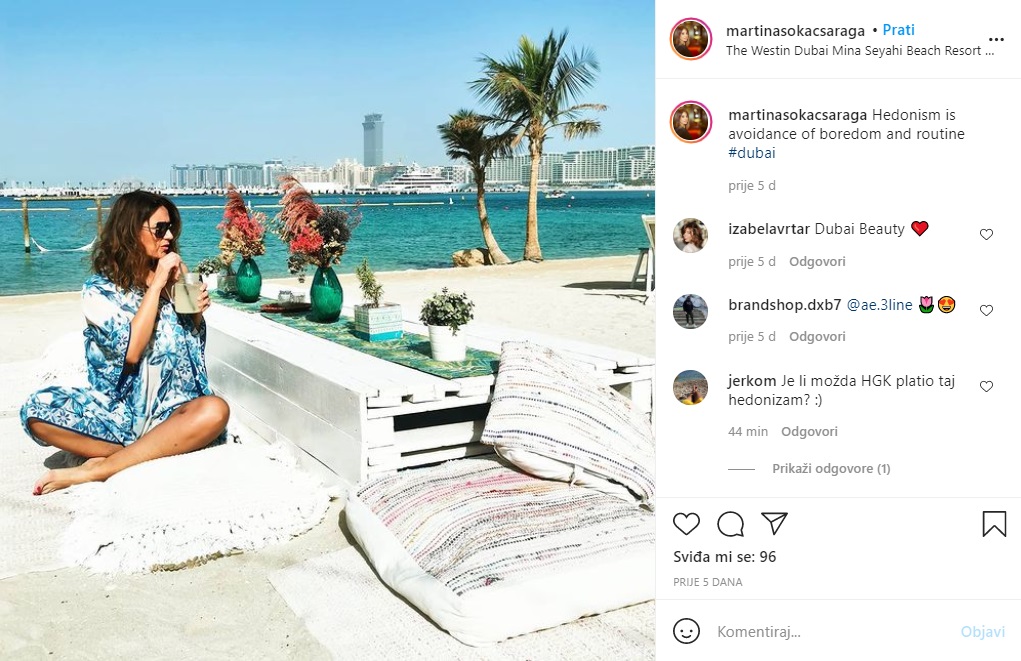
(Photo Instagram/Index.hr)
Salaries can't be bad in the present crisis, as Index discovered in an article a few days ago about two senior HGK employees enjoying the high life in Dubai, as many back home wonder where the next pay cheque is coming from and when they will be allowed to earn money again. HGK informed Index that the Dubai trips were not at HGK expense, which may be the case, but it still left a poor taste to many struggling on meagre incomes in a cold Croatian winter.
Indeed, salaries seem to be rather good at HGK, as Index found out with a little research. Current HGK boss Luka Burilovic brings home 56,000 kuna a month, which (headline above) 'I know might seem a lot to some, but I have been working 30 years.'
The focus on HGK reform has been a hot topic in recent weeks, as the opposition sense the possibility of change. A vote on obligatory contributions was pulled at the last minute by Plenkovic last week, as it seems the government did not have enough votes to protect the current status quo. Since then, it has been interesting to watch the statements of certain MPs who once railed against HGK and are now defending the need for its existence in current format. A lesson in Croatian political horse-trading, which is holding this country back for years now.
But there is a wind of change, and promises for HGK reform have been made - as I understand it - a vague plan to implement a phased introduction of change in a few months. Conveniently after the local elections. There is very little trust left these days, and if the government was sincere, it has the ability to introduce rapid change. Just look at the digital nomad visa, for example. Plenkovic introduced amendments to legislation in Parliament the day after he announced it, and five months later, American Melissa Paul became the first recipient of Croatia's digital nomad visa.
I was glad that I made the effort to go to not only show my support, but also get a better understanding of the issues.
And, the eternal optimist about Croatia's future, I will sleep a little easier tonight. Yes, the mountains are huge, and the resistance is large, but so too is the determination for change. There are a lot of inspiring people pushing in the same direction. The twin viruses of technology and transparency will eventually prevail, perhaps later than sooner, but change is coming.
I look forward to the month soon when I have 42 kuna more to spend on my business each month.
February 3, 2021 was a good day.
Interview with Drazen Oreascanin at the Zagreb protest. You are advised to turn on the subtitles, as the sound quality is not the best (my apologies, the interview was impromptu).
For the latest from UGP, follow the dedicated TCN Glas Poduzetnika section.
Minister: Protests Normal Way to Express Dissatisfaction in Democracy
ZAGREB, 3 February 2021 - Economy and Sustainable Development Minister Tomislav Ćorić on Wednesday commented on a protest organised by the Voice of Entrepreneurs (UGP) association in Zagreb's main square earlier in the day, saying that in democracy protests are a normal way of expressing dissatisfaction.
Addressing reporters in Sisak after a meeting on a programme of support to SMEs in Sisak-Moslavina County, Ćorić said that he had heard that his name was mentioned a lot during the rally and that protestors called for his resignation.
"Do not expect me to comment on that or on the wishes of those who are generally inspired by the leaders of the association that organised the protest. I have said all I had to say about them. I believe that their demands are incredible on the one hand and on the other, these people have a political agenda, which is evident in the fact that quite a lot of opposition members were there," Ćorić told reporters.
Asked to comment on the fact that there were a lot of students and other people at the protest who do not have any connections with UGP, Ćorić said that there are different types of people dissatisfied with the situation in the country, adding "Let's get back to the reasons for the dissatisfaction of the association that organised the protest with my conduct and my position."
"They can be found in the fact that at one of the meetings that we organised, the government made it clear that reducing VAT in the current situation, when the budget is under a lot of strain and a part of businesses have been closed, is not realistic. As minister I will always clearly articulate my stance on whatever topic when that is necessary. And I did so before these businessmen in this concrete case too, and I don't see anything wrong about it," added Ćorić.
Asked about a proposal that could be heard at the protest, namely that government ministers receive a wage HRK 4,000 until the end of the year, Ćorić said that there is no need for that and that the proposal is nothing more than populism, "which is something we have been witnessing frequently in Croatia lately."
Dalić will Push for Podravka's Stronger Market Performance and Exports
ZAGREB, 3 February 2021 - After her appointment as the new president of Podravka's management board, Martina Dalić told reporters that she envisaged this food company with even stronger market performance and higher exports, using new technology and boosting profitability and productiveness.
The Podravka food manufacturer's Supervisory Board appointed Dalić as the new president of the management board and her term lasts until 23 February 2022.
Dalić thanked the Board, which unanimously decided on her appointment, and shareholders for their trust, particularly the government as the largest single shareholder in this Kprivnica-based company.
She also thanked Prime Minister Andrej Plenković for his support and trust.
"Podravka is one of the largest Croatian companies, a regional company, a Koprivnica company and it is an exceptional honour to head a company with such a tradition," Dalić underscored, adding that being at the helm of that company is a great responsibility.
As she said, she has spoken with the largest shareholders in the company, representatives of the state and pension funds who confirmed that their common aim is for Podravka to grow and develop, expressing their confidence that that is also the wish and expectation of workers, the local community and business partners.
Replying to reporters' questions about Podravka's future, Dalić said that she sees it as a "company that has an even stronger performance on the market, greater exports, as a company that uses new technology even more to improve business, profitability and productiveness."
Asked how her engagement to head that Koprivnica food company came about and to comment on criticism that this is yet more proof that politics does not want to let go of Podravka, Dalić said that she was not in a position to comment on the process shareholders used and how they came to engage her for the job.
"I am personally exceptionally pleased that the largest individual shareholder - the government, supported my appointment," she said and added that that means a lot but also represents additional responsibility because the ownership structure reflects the company and the state expects a lot from it but also at the same time, pension funds too expect a lot with regard to efficiency and profitability.
Asked about the Borg scandal which was the reason why she stepped down as the economy minister in the Plenković cabinet in 2017 and whether that could affect the company's image, Dalić said that she explained her reasons for her resignation when she resigned as a deputy prime minister, and that she still stands by them. The background to all that, she said, are the results of the process of restructuring Agrokor.
"I can express my great satisfaction that that process succeeded and that Agrokor was bailed out, that the cost of the bail out was not covered by the state or the budget, which is something I advocated at the time. Hence, I think that the job done in Agrokor, which I conducted on behalf of the government on the most part with the help and support of the prime minister represents one great experience in fact and a great reference for this job. That is an economic process that succeeded and where we showed that here in Croatia we can manage big economic problems in a short period and with very favourable results for the economy and budget," she underscored.
73% of Health Workers Want to be Vaccinated against COVID-19
ZAGREB, 3 February 2021 - A survey in the health sector indicates that 73% of health workers in Croatia plan to get vaccinated against COVID-19 or have already done so while 10% do not plan to even though they did not have COVID-19 and are not protected with anti-bodies.
So far, 24% of health workers have been vaccinated and the plan is to vaccinate another 49%. The level of confidence in the safety of vaccines amongst health workers is high and amounts to 76%, shows the survey, conducted in January before the start of a nation-wide vaccination campaign.
Almost 9,000 doctors, nurses, physiotherapists, midwives, dentists, psychologists, pharmacists, and other medical personnel participated in the survey.
"It is interesting to note that 2 out of 10 respondents had contracted COVID-19. Just over half of the respondents (56%) believe they could get infected while almost as many (55%) consider COVID-19 to be a dangerous disease," a press release said.
Health workers were asked to evaluate, on a scale of 1 to 7, their stance regarding several psychological predictors that are crucial to deciding about getting vaccinated. People willing to be vaccinated have a tendency to consider vaccines to be safe, do not underestimate the danger of the disease, weigh the pros and cons less, and have a greater level of collective responsibility.
The majority of health workers who have been vaccinated or plan to get vaccinated against COVID-19 have in the past five years also been vaccinated against the flu.
Health workers assessed the safety of the COVID-19 vaccine with a score of 5.4 on a scale of 1 to 7. They gave the same mark for the importance of analysing the risks and benefits of vaccination prior to making a decision.
There are 73,000 people employed in Croatia's health system.


